How to Spot and Take Advantage of Soft Betting Lines
The best sports bettors aren’t psychics, although you might think they have a touch of ESP sometimes. But nope! There is no sixth sense going on (that we are aware of, at least); they’re just opportunists. And where are the biggest opportunities? They’re hiding in plain sight, and they’re called soft betting lines.
Soft sports betting lines are the mispriced odds that give bettors a statistical edge over the sportsbook. Unlike the “sharp” lines, which are polished by algorithms and professional action, soft lines emerge from things like bookmaker oversights, public biases, or gaps in market efficiency. But they are fleeting, which means that they call for speed, analysis, and a really trained eye. So, if you can get the hang of them? The rewards can be amazing!
Want to know how you can spot and take advantage of soft sports betting lines? You’re in luck because our guide will tell you how to:
- Spot soft lines in major leagues like the NFL and NBA, as well as niche markets.
- Understand why they exist and pop up (hint: human error and hype play starring roles).
- Profit using proven strategies if you’re placing $20 bets or want to build a bankroll.
What Are Soft Sports Betting Lines?
Soft betting lines are the hidden gems of sports wagering. They’re the odds that don’t show the real probability of an outcome, basically, the sportsbook’s blind spots. And exploiting them? That’s how smart bettors can change the odds in their favor.
What exactly is a soft line? It’s a bet that is mispriced due to factors like bookmaker errors, public bias, or inefficiency in the less popular markets. It’s kinda like a pricing glitch in the betting world.
In contrast to sharp lines, which are “correct” odds that are shaped by algorithms, professional bettors, and heavy betting volume. They’re nearly impossible to beat. Soft lines? They’re the chinks in the armor.
The following are examples of soft lines in the most popular sports:
- NFL: A public team like the Kansas City Chiefs will probably have inflated odds (-350) against a lesser-known but statistically strong opponent because of fan bias.
- NBA: A star player’s injury goes unnoticed by casual bettors, and that leaves a soft line on the opposing team’s moneyline.
- Soccer: A Champions League underdog with strong defensive stats gets undervalued because the sportsbook overweighs any recent losses.
- MLB (Baseball): A star pitcher’s last-minute scratch due to an illness isn’t widely reported, which leaves a soft line on the opposing team’s run total. Recreational bettors will pile on the original favorite, and the sharps will target the mispriced underdog.
- NHL (Hockey): A backup goalie starts unexpectedly, but the sportsbook delays updating the odds. The underdog’s puck line (+1.5) becomes a solid steal for bettors who are tracking the lineup changes.
- Tennis: A top-10 player withdraws from a tournament due to an injury, but casual bettors continue to back their pre-tournament futures—the sportsbook delays adjusting odds, which creates soft lines on the remaining contenders.
- College Football/Basketball: Public bias toward ranked teams creates inflated spreads. A #5-ranked college basketball team could be favored by -12.5 against a defensive-minded mid-major, even though their last five wins were by single digits.
- MMA/Boxing: A hyped fighter’s odds stay overly favorable despite a stylistic mismatch. Casual bettors always chase name recognition, but the experts are exploiting the soft line on the underdog.
Why Do Soft Lines Exist?
Soft lines aren’t a random thing—they’re born from really predictable voids in the betting ecosystem. Why do they appear, and how can you anticipate them? Keep reading to find out!
Public Perception
Betting apps will usually inflate odds for popular teams or star players to bring in more casual bettors, even when the math just doesn’t justify it. Case in point: The Los Angeles Lakers opened as -180 favorites against the Denver Nuggets despite missing two starters. The odds stayed artificially high due to the public hype around LeBron James’s “final season,” which created a soft line on Denver’s +150 moneyline. Sharps pounced, and the Nuggets won 112-105, and that demonstrates just how fan sentiment can skew lines when they aren’t based in reality.
Bookmaker Errors
We all make mistakes, and bookmakers are human, too! An oversight or rushed adjustments can cause glaring mispricings, especially in quick-moving markets. A rising UFC star, Mateo Silva, replaced an injured main-event fighter on 24 hours’ notice. Most sportsbooks kept Silva’s odds at +220 due to delayed updates, despite his 12-0 record. Bettors who acted early cashed in when Silva won via first-round KO, and this illustrates how operational snafus can create fleeting soft lines.
Market Timing
Opening lines are usually softer before sharps and algorithms get the chance to refine them. Take note of the College Football Playoff opener: The University of Miami opened as -7.5 favorites over Florida State based on outdated preseason rankings, ignoring FSU’s dominant defense. Sharps absolutely hammered FSU +7.5 within minutes, moving the line to -3.5—this left casual bettors stuck with worse odds. When you act fast on early lines, you can lock in value before it disappears.
Less Popular Markets
Niche sports lack the data and attention needed to maintain efficient odds. During the Australian Football League (AFL) Grand Final, sportsbooks undervalued the Western Bulldogs’ defensive stats, as it listed them as +180 underdogs against Collingwood. Smart AFL bettors recognized the mismatch, and the Bulldogs won outright 89-76. Decreased liquidity and expertise in these markets make soft lines way more common.
How to Identify Soft Sports Betting Lines
Spotting soft lines is part science, part art. It takes some good tools, lots of research, and a willingness to dig in deeper than the average bettor would. Next up, we go over six proven methods to uncover mispriced odds—and turn them into bank.
1. Compare Odds Across Multiple Sportsbooks
Sportsbooks don’t always agree on odds, especially in fast-moving or niche markets, and by tracking any discrepancies, you can pinpoint soft lines before they’re corrected. For example, in Week 2 of the NFL season, the Kansas City Chiefs opened as -7.5 favorites against the Houston Texans at DraftKings, but FanDuel posted them at -6.5 due to a delayed injury update on Texans’ QB C.J. Stroud. Bettors who “line shopped” and took Chiefs -6.5 at FanDuel cashed in big when Kansas City won by 10.
- Actionable Step: Use tools like OddsChecker or OddsJam to compare live odds across 20+ sportsbooks. Concentrate on spreads, moneylines, and totals where the differences exceed 1.5 points or +20¢ in value!
2. Monitor Line Movements
Sharp bettors move lines fast, so if a line shifts dramatically within minutes of opening? It usually means that a soft line is being exploited. During the NBA Playoffs, the Boston Celtics opened as -4.5 favorites against the New York Knicks. Within an hour, the line jumped to -7.5 after sharps pounded Boston due to an undisclosed injury to Knicks star Jalen Brunson. Bettors who tracked this movement early secured Celtics -4.5 before it was corrected.
- Actionable Step: Set up alerts on platforms like Action Network or Sports Insights to get notified of any sudden line shifts. Look for “steam moves” (rapid, one-directional betting) as a sign.
3. Leverage Betting Models
Betting models calculate the “true” probability of an outcome using stats like expected goals (xG), defensive efficiency, or pace of play. When sportsbook odds deviate considerably from the projections, congrats! You’ve found yourself a soft line. An MLB model flagged the San Diego Padres as +140 underdogs against the Dodgers despite their pitcher’s elite ground-ball rate against L.A.’s power hitters. The Padres won 4-1, and this rewarded the model-driven bettors.
- Actionable Step: Subscribe to a model (e.g., TeamRankings or Bet Labs) and bet when the sportsbook’s implied probability is 5-10% off your calculation.
4. Stay Updated on News and Injuries
Sportsbooks can’t always react to breaking news, so follow beat reporters, team social media, and injury trackers to catch any soft lines before they’re adjusted. When tennis star Iga Świątek withdrew from the Miami Open 30 minutes before her match due to an illness, some books kept her odds at -250. Bettors who saw the news first pounced on her opponent’s +350 line.
- Actionable Step: Use real-time apps like Underdog NBA (for injuries) or FlashScore (for live updates) to stay ahead of the market.
5. Concentrate on Niche Markets
Soft lines do really well in less popular leagues where sportsbooks invest in way fewer resources. In the Canadian Football League (CFL), the Ottawa Redblacks opened as +7.5 underdogs against the Winnipeg Blue Bombers. Very few books accounted for Winnipeg’s starting QB being sidelined with food poisoning, and that created a soft line that sharp CFL bettors exploited for a 24-20 Ottawa upset.
- Actionable Step: Master one niche sport (e.g., Korean baseball, NCAA volleyball) where you can spot any inefficiencies that others will miss!
6. Use Sports Analytics Websites
Advanced stats are great for exposing mismatches that oddsmakers overlook. During the NHL season, analytics site MoneyPuck highlighted the Florida Panthers’ league-worst penalty kill (68%) against the Edmonton Oilers’ top-ranked power play (32%). Despite this, sportsbooks priced the Oilers’ team total at 3.5 goals (-110). Bettors who referenced the data took the over, which hit in a 5-2 Oilers win.
Strategies to Take Advantage of Soft Lines
Finding soft lines is just half of the battle—you also have to execute the right strategy to turn those insights into a profit. Below, we break down six proven tactics to exploit mispriced odds and give some real-world examples to show you exactly how it’s done!

Timing Is Everything
Soft lines vanish in a heartbeat. Betting early—especially when lines first open—lets you lock in value before sharps or algorithms have the chance to correct it.
- Example: In the NCAA March Madness tournament, Duke opened as -8.5 favorites against UConn, a line based on outdated defensive metrics. Sharp bettors noticed UConn’s top-10 adjusted defensive efficiency and hammered +8.5 within minutes. The line shifted to -5.5 two hours later, but early bettors secured a 78-70 Duke win and cashed in on UConn’s +8.5 spread.
- Actionable Step:
- Set alerts for line releases on platforms like Action Network.
- Prioritize bets within the first 15-30 minutes after the odds go live.
Line Shopping
Sportsbooks don’t adjust lines at the same exact speed, so comparing odds across several platforms will allow you to see any hidden value.
- Example: During the Wimbledon men’s final, Carlos Alcaraz opened at -150 on BetMGM but -130 on FanDuel due to a delayed adjustment for his minor ankle injury. Bettors who “shopped” and took Alcaraz -130 at FanDuel saved 20¢ in vig and cashed when he won in straight sets.
- Actionable Step:
- Use odds aggregators like OddsJam to scan 20+ books in real time.
- Concentrate on discrepancies of 10-20¢ or 1-2 points in spreads/totals.
Specialize in One Market
A solid expertise in a niche sport or league means that you will be able to identify soft lines that others will miss.
- Example: In the Japanese NPB (baseball) season, the Hanshin Tigers were listed as +120 underdogs against the Yomiuri Giants. NPB specialists knew the Tigers’ ace had a 1.98 ERA in night games, while oddsmakers overlooked the split. Hanshin won 3-1, and this rewarded the savviest bettors.
- Actionable Step:
- Pick a less-covered league (e.g., Australian NBL basketball, CFL).
- Follow beat reporters and local analytics sites for an edge over other bettors.
Bankroll Management
All betting comes with risk, and soft lines are not an exception to this rule. But with proper staking, you’ll be able to survive losing streaks and compound wins.
- Example: A bettor identified a soft line on the WNBA MVP race, allocating 2% of their bankroll to A’ja Wilson at +400. When Wilson won, the profit funded future soft-line bets without risking overexposure.
- Actionable Step:
- Use the Kelly Criterion or flat 1-3% stakes per bet.
- Never chase losses with oversized wagers.
Monitor Public Betting Percentages
Soft lines usually tend to happen when recreational bettors inflate the odds for the most popular teams. But fading the crowd can really pay off!
- Example: In the NFL season opener, 85% of public money backed Patrick Mahomes’s Chiefs -9.5 against the Raiders. Sharps recognized the line was inflated by Mahomes’s fame and bet Raiders +9.5. Kansas City won 24-17, but Raiders backers cashed in.
- Actionable Step:
- Track public betting splits on Sports Insights or Pregame.com.
- Bet against teams with >70% public support if the analytics disagree with the hype.
Target Prop Bets and Alternate Lines
Props (e.g., player strikeouts, QB passing yards) and alternate spreads/totals are absolute breeding grounds for soft lines.
- Example: Ahead of the Masters, sportsbooks set Jon Rahm’s “Top 5 Finish” odds at +200, totally ignoring his recent dominance at Augusta. Prop specialists jumped on it—Rahm placed 3rd, turning a $100 bet into $300.
- Actionable Step:
- Use props to exploit bookmakers’ limited staffing in niche markets.
- Track player/team trends (e.g., “Luka Dončić over 9.5 assists” in back-to-back games).
Common Mistakes to Avoid
Soft lines do seem like they’re the low-hanging fruit of bets, but even the most experienced bettors can get into trouble. The mistakes below aren’t just theoretical—they’re born from real-world blunders that erode profits, strain bankrolls, and test discipline. The following are the 7 most common no-no’s and how you can swerve them.
– The Trap: Yes, soft lines signal value, but they don’t guarantee wins. Betting too aggressively on perceived “locks” can drain your bankroll faster than a teenager who has daddy’s credit card.
– How It Happens: Take the UEFA Champions League quarterfinals. Manchester City opened as +120 underdogs against Bayern Munich due to a delayed update on Bayern’s injured goalkeeper. A bettor, who was convinced of an edge, wagered 25% of their bankroll on City. But Bayern’s backup keeper delivered a career performance, and City lost 2-1. The bettor’s overconfidence turned a statistical edge into a super costly mistake.
– The Fix: Quantify your edge using a model or historical data. If your win probability is 55%, bet 2-3% of your bankroll—not 25%. Treat soft lines as incremental gains, not as winning lottery tickets.
– The Trap: Failing to track how odds shift means you’re often betting on corrected lines, not soft ones.
– How It Happens: During the Stanley Cup Playoffs, the Colorado Avalanche opened as -1.5 favorites (-110) against the Vancouver Canucks. Sharp bettors noticed Vancouver’s top scorer was playing through injury and hammered the Canucks +1.5, moving the line to -1.0 within 20 minutes. A recreational bettor who was unaware of the shift took Avalanche -1.5 at -110 and lost when Colorado won 3-2 (failing to cover).
– The Fix: Use tools like LineWatcher or Sportsbook Review to track line history. If you miss the original soft line, wait for the next opportunity—don’t chase!
– The Trap: A soft line might exist for reasons that you haven’t considered—like unreported injuries or weather changes.
– How It Happens: In the PGA Championship, sportsbooks listed Rory McIlroy as a -140 favorite at Bethpage Black. Bettors pounced, as they were unaware that McIlroy had tweaked his swing earlier that week—a detail that was buried in a European golf podcast. McIlroy missed the cut, and the soft line became a trapdoor.
– The Fix: Cross-reference news sources, including international outlets and niche forums. Ask yourself this: Why is this line soft? If you can’t answer the question, don’t make the bet.
– The Trap: Desperation causes people to make reckless bets on soft lines in markets that they are unfamiliar with.
– How It Happens: After losing four straight NFL bets in October, a bettor forced a wager on a soft line in the Turkish Basketball League—a league they’d never followed. The line was mispriced, but without understanding the team’s travel fatigue, they backed the wrong side and dug themselves into an even deeper hole.
– The Fix: Stay with the sports and leagues that you know inside out and use a loss limit (e.g., stop after 3 losses in a row).
– The Trap: Vig (sportsbook commission) and withdrawal fees can eat into your profits.
– How It Happens: A bettor exploited 12 soft lines in June 2025, winning 8. But the -110 vig on each bet and $10 withdrawal fees per payout turned a 22% gross ROI into a 9% net gain.
– The Fix: Negotiate a decreased vig via VIP tiers at books like BetMGM or DraftKings. Use crypto sportsbooks (Bovada, Nitrogen Sports) to avoid any kind of transaction fees.
– The Trap: Betting strategies that worked in the past might not work in evolving markets.
– How It Happens: A bettor relied on a 2023 model for NBA player props, as they were unaware that rule changes had increased scoring league-wide. They consistently bet unders on points totals, only to lose as players like Victor Wembanyama shattered expectations.
– The Fix: Regularly update your models and strategies to reflect any and all rule changes, player trends, and market shifts. Use platforms like Basketball Reference or StatMuse to track league-wide trends.
– The Trap: Even if you have a winning strategy, emotional decision-making can (and does) sabotage results.
– How It Happens: A bettor identified a soft line on last year’s Kentucky Derby and wagered 10% of their bankroll on a longshot. When the horse lost, they doubled down on another soft line in frustration, which ignored their usual 2% stake. The second bet also lost, and that wiped out weeks of progress.
– The Fix: Use pre-set staking plans (e.g., flat 1-2% per bet) to totally remove emotion from the equation. Take breaks after your losses to reset mentally.
Conclusion: Soft Lines = Sharp Wins
Soft betting lines are so much more than opportunities—they’re a real chance to outsmart the sportsbook by finding those odds that don’t show the true probability of an outcome. When you learn and know how to spot and exploit mispriced odds, you can sway the odds to your advantage and get a sustainable edge!
Look below for a brief recap of the main strategies of how to spot and take advantage of soft sports betting lines:
- Compare odds across multiple sportsbooks to find any kind of discrepancies.
- Monitor line movements to identify any sharp action so that you are able to lock in value early.
- Leverage betting models to calculate true probabilities and identify any mispriced lines.
- Stay updated on all news and injuries to catch soft lines before they’re corrected.
- Specialize in niche markets where inefficiencies are way more common.
- Use advanced analytics to uncover hidden trends and mismatches.
Listen up: Soft lines aren’t a free pass to profits. Success will take discipline, research, and the right tools. It’s the same if you’re betting $10 or $1,000, so act accordingly: react quickly, stay in the know, and never chase losses! Gambling responsibly is the most important part of betting.
Start out small. Track lines, compare odds, and test your strategies in low-stakes markets. As you get your feet underneath you, you’ll see that soft lines aren’t just one-offs or flukes—they’re a regular road to profit.
Want to take your betting game to another stratosphere? You can find and explore so many advanced strategies and other resources in our Sports Betting Guide!
Can Automated Betting Bots Outperform Human Gamblers?
Casinos are crackling with a whole different kind of energy, and it’s not emanating from the human gamblers. There’s a new breed of player trying to stake its claim, and it’s one that calculates odds in milliseconds and never looks at the clock.
What or who on earth are we talking about? Automated betting bots. That’s right, bots. And they are armed with algorithms that are sharper than a card shark’s intuition on their best day. They can stalk poker tables and sportsbooks, taking apart games into binary decisions: bet or fold, raise or retreat. These are no ordinary gamblers; they’re probability assassins, and they are built to exploit statistical edges humans might miss.
But can machines, for all their precision, replicate the audacity of a bluff that’s pulled out of thin air—or the desperation of a Hail Mary parlay?
Betting bots are software engineered to turn gambling into a science. They analyze historical data, see biases in real-time (like a roulette wheel’s imperceptible tilt), and execute bets with emotionless efficiency. The one thing that they lack? The human touch that can read a rival’s twitch or sense a dealer’s tells.
Could gambling become a battle between man and machine? Is it logic vs. instinct or code vs. creativity? We are going to get scientific and compare the strengths and weaknesses of betting bots and human gamblers to see who (or what) has the upper hand!
What Are Automated Betting Bots?

What exactly are betting bots? Like we said above, they are sophisticated software that is designed to act just like tireless, logic-driven gamblers—processing data, calculating risks, and executing bets with mathematical precision. Unlike human players, these bots don’t need to rely on intuition or luck; they change gambling into a numbers game, and it’s all governed by algorithms and probabilities.
Here is how these automated betting bots get things done:
- Algorithms: Predefined rules or adaptive machine learning models dictate all of their decisions. For instance, a bot can analyze decades of football match data to predict scoring trends.
- Historical Data: Bots identify patterns in past outcomes, like a blackjack dealer’s shuffling bias or any recurring inefficiencies in sportsbook odds.
- Real-Time Analytics: Live game stats, odds fluctuations, and even breaking news (e.g., player injuries) can inform split-second betting choices.
And the following are the most common types of betting bots:
-
- Scan multiple betting platforms to find discrepancies in odds (e.g., a tennis player priced at 1.90 on Site A vs. 2.10 on Site B).
- Place opposing bets to guarantee a profit, regardless of the outcome.
-
- Calculate “value” by comparing bookmaker odds to true probabilistic outcomes.
- Bet aggressively when odds undervalue an event’s likelihood (e.g., a 40% chance priced as 30%).
-
- These automatically leverage any and all promotional offers (e.g., free bets) across bookmakers.
- Neutralize risk by covering all possible results via strategic lay bets.
-
- Use regression models to forecast game results based on variables like team form, weather, or venue history.
-
- Adapt predictions in real-time during live matches.
Bots do excel at exploiting statistical edges, but they are missing the human capacity to adapt to unquantifiable factors—like a star athlete’s off-field drama or the psychological tension at a high-stakes poker table. The war isn’t only man vs. machine; it’s also calculation vs. context.
How Betting Bots Work
Betting bots are super sophisticated systems that are built to transform raw data into profit. They are working like invisible croupiers, scanning tables, crunching numbers, and placing bets and human players are basically unaware that it’s happening. Below, we unpack all of their mechanics—and why they’re upending certain parts of the gambling rulebook.
Data Analysis & Machine Learning
Bots literally exist to get information, so they devour historical results, player stats, and real-time variables like weather or live game momentum. The machine learning models then step in to refine strategies autonomously.
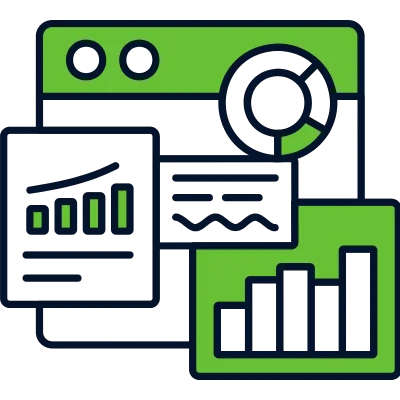
- A sports bot might learn that Team X’s scoring drops by 20% in rainy conditions.
- A poker bot will adapt its bluff frequency based on opponents’ fold rates.
- Casino bots analyze thousands of roulette spins to detect if there are any wheel biases.
Real-Time Odds Monitoring
Speed is the bot’s ultimate weapon—they track odds across hundreds of bookmakers and exchanges, and are able to spot any discrepancies in milliseconds.

- Arbitrage bots compare prices on Site A (odds: 1.90) and Site B (odds: 2.10) to lock in risk-free profit.
- Value bots flag undervalued outcomes, like a 40% probability event priced at 30%.
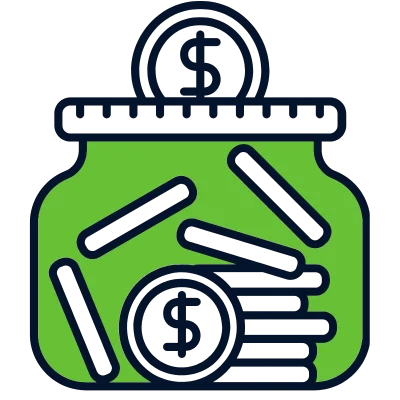
Automated Bet Placement
Once an edge is identified, bots execute bets instantly—no hesitation and no typos.
- APIs connect directly to betting platforms for seamless transactions.
- Browser automation tools mimic human clicks to place bets on sites without API access.
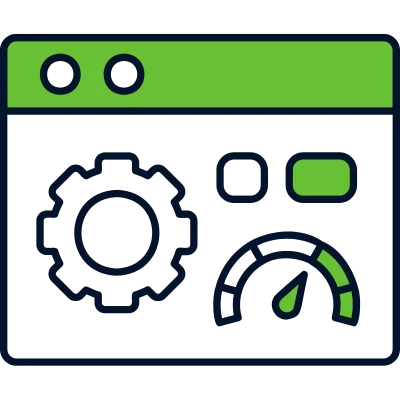
Speed & Efficiency: The Bot’s Edge
- Human gamblers blink; bots capitalize.
- Odds shift? Bots adapt bets mid-refresh.
- A casino dealer pauses. Bots recalibrate.
- A sports star gets injured mid-game? Bots hedge or exit before the news hits X (aka Twitter).

Real-World Bots
- BetBurger: Scans for arbitrage opportunities across 60+ bookmakers, and its specialty is in live sports.
- RebelBetting: Concentrates on value betting—it identifies mispriced odds in soccer, tennis, and basketball.
- PokerSnowie: Employs AI to teach GTO (game theory optimal) poker strategies and adapts to table dynamics.
- Gambot: Targets casino games using statistical models to exploit any blackjack and roulette biases.
Bots don’t just have the ability to outpace humans—they can outthink them, too. But while they dominate with speed and precision, they’ll never be able to mimic the thrill of a gut-driven all-in or the agony of a bad beat. So the question really isn’t if bots win. It’s how much they’ll change the game.
Comparing Betting Bots and Human Gamblers
The rivalry between automated betting bots and human gamblers is a collision of two worlds: one is governed by calculation. The other? Fueled by instinct and adaptability. Bots really excel in structured environments but humans do their best work in ambiguity. Below is how their strengths stack up when pitted against one another.
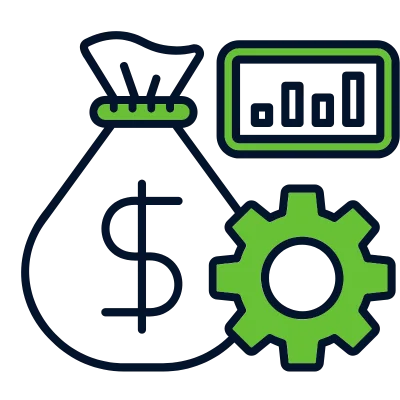
Betting Bots
Betting bots are precise without a pulse. They are well-ordered architects, as they are built to exploit mathematical edges with mechanical discipline.
- Lightning-Fast Execution: Bots scan thousands of data points—odds, trends, live scores—and place bets faster than a human refresh a browser. A fleeting arbitrage window? Captured in milliseconds.
- Emotionless Consistency: No tilt, no overconfidence. Bots follow strategies like a metronome—it doesn’t matter if the last hand was a win or a loss.
- Data Dominance: They analyze decades of sports results, casino game histories, or poker hand logs to uncover any patterns that humans might have missed over lifetimes.
- Nonstop Endurance: Bots work 24/7 and are immune to fatigue or distraction—they don’t even know what those things are.

Human Gamblers
Humans bring creativity and nuance to the casino table, which are traits that no algorithm, no matter how advanced, will ever be able to replicate fully.
- Intuitive Mastery: A poker pro is able to detect a bluff from a wobbly voice or a delayed bet. A sports bettor intuits shifts in team morale that stats ignore. Bots only see numbers; humans can read other humans.
- Adaptive Strategy: When game conditions change (e.g., a blackjack dealer alters shuffling tactics), humans adapt on the fly. Bots? They’re stuck in their programming until they get an update.
- Psychological Warfare: Humans manipulate opponents’ emotions—trapping tilt-prone players or bluffing with calculated theatrics. Bots can’t feign weakness or exploit desperation.
- Contextual Insight: Humans recognize when “hot streaks” are luck versus skill, or when a slot machine’s “near miss” is a programmed tease. Bots treat every single outcome as hard data.
Can Betting Bots Really Outperform Human Gamblers?
The debate isn’t about if bots can win—it’s about when, where, and how much. Automated systems have already proven their prowess in controlled environments, but gambling’s wildcard—the human element—will always tip scales in unpredictable ways. Let’s take a look at the evidence, expose the flaws, and find out which one actually outperforms the other in the gambling world!

Success Rates: Bots in the Wild
Bots do their best work in structured, data-rich environments. How? The real-world examples below show their potential—and where they come up short!
- Sports Arbitrage Bots: Platforms like RebelBetting report user returns of 5-10% monthly by exploiting odds discrepancies. But the profits are shrinking as bookmakers are cracking down on arbing.
- Poker Bots: In 2024, a study found that AI poker bots outperformed 90% of human players in heads-up matches. But they struggle in multi-table tournaments with more dynamic player pools.
- Casino Bots: A 2021 experiment showed a roulette bot getting a 12% edge by exploiting wheel biases over 10,000 spins. But today, almost every online gambling site uses RNGs (Random Number Generators) to neutralize these kinds of tactics.
- Crypto Betting Bots: During Bitcoin’s 2021 bull run, some bots yielded 300%+ returns by trading volatility. The rub? A single market crash could wipe out all gains.
Bots really excel in niches that have clear rules and abundant data. But their success all hinges on stable conditions, and that is a rare luxury in the chaotic gambling world.

Bot Limitations: The Cracks in the Code
Bots aren’t infallible—far from it, and what are their weaknesses? Well, they are glaring, as evidenced by the points listed below:
- Data Dependency: Bots crumble with poor or outdated data. For example, a Premier League bot trained on pre-COVID stats failed when matches moved to empty stadiums, altering team dynamics.
- “Garbage in, garbage out” applies brutally here.
- Predictability Blindspots: Bots can’t handle black swan events. When a star quarterback ruptured his Achilles mid-game in 2023, human bettors hedged instantly. Bots? They kept betting on the outdated trends.
- No Qualitative Analysis: A bot can’t factor in a poker player’s nasty divorce affecting their focus or an NBA team’s locker-room feud. Humans are able to use these sorts of intangibles to pivot their betting strategies.
- Detection Risks: Platforms like PokerStars and Bet365 deploy anti-bot algorithms. Get flagged, and you’re banned—profits confiscated.

Human Edge: Intuition Beats Algorithms
Human beings will always come out on top in any scenario that requires creativity, adaptability, and psychological insight:
- Live Poker Reads: Pros like Daniel Negreanu exploit “timing tells”—a hesitation before a raise signals weakness. Bots can’t replicate this nuance.
- In-Play Sports Adjustments: When a soccer match turns physical, human bettors shift to “yellow card” markets. Bots stick to pre-programmed strategies.
- Exploiting Tilt: A human might goad an emotional player into reckless bluffs. Bots lack this manipulative flair.
- Narrative Betting: The 2023 Super Bowl saw a surge in bets for underdog narratives (e.g., “Cinderella story” teams). Bots, which were laser-focused on stats, missed the wave.
Case Study: In 2019, a blackjack team exploited a dealer’s subconscious card-peeking habit—a tell only humans could spot. The bot-driven rivals, who relied only on card counting? They missed this edge entirely.
Strategy & Bankroll Management: The Great Equalizer
Whether bot or human, any long-term success all hinges on discipline and that means gambling smart and responsibly no matter if you’re a man or machine.

For Bots
- Risk Parameters: Set stop-loss limits to prevent catastrophic failures (e.g., a 5% daily loss cap).
- Diversification: Spread bets across markets to avoid overexposure. A sports bot might mix arbitrage, value, and matched betting.
- Adaptive Learning: Regularly update algorithms to counter detection or market shifts.

For Humans
- Emotional Control: Use tools like session timers or loss limits to combat tilt.
- Contextual Flexibility: Shift strategies based on game flow—tighten up against bots, loosen against recreational players.
- Bankroll Rules: Never risk more than 1-2% of your roll on a single bet, which is a lesson that poker feat Phil Ivey credits for his longevity.
The Final Tally

Here’s where the betting bots do their best work:
- Speed and data matter most (arbitrage, casino biases).
- Markets are stable and predictable (pre-match sports betting).
- Emotions are a liability (grinding poker cash games).

And the humans take home the win for the following:
- Unpredictability reigns (live poker, in-play sports).
- Psychological factors dominate (bluffing, exploiting tilt).
- Nuance always wins out over numbers (narrative-driven bets).
What does the future hold? It looks like it’ll be a hybrid approach. Pros like Doug Polk use bots to analyze hand histories and then apply human intuition to adjust their strategies. On platforms like Unikrn, people are using AI predictions mixed with crowd wisdom to make sharper odds.
Bots are only tools—they are in no way replacements. Yes, they can amplify edges but they can’t replicate the ingenuity that makes gambling such a human drama. The real winner will be those who wield both.
Ethical and Legal Considerations of Using Betting Bots
Automated betting bots are smack dab in the middle of innovation and controversy, and that will force players, platforms, and regulators to grapple with all of their implications. Sure, they bring unparalleled efficiency, but their use raises some really important questions about fairness, legality, and societal impact. Below, we take a clear-eyed look at all of the challenges that they pose.

Are Betting Bots Legal?
The legality of betting bots all depends on jurisdiction and platform policies, which means it comes down to where you live. Even then, it’s a confusing patchwork of compliance risks.
- United Kingdom: The UK Gambling Commission prohibits bots that in any way manipulate game outcomes. Platforms like Bet365 use AI to detect and ban automated accounts.
- United States: Nevada and New Jersey explicitly outlaw bots in licensed casinos, but unregulated offshore sites usually will tolerate them.
- European Union: Germany enforces strict bans, but Malta’s more lenient policies do attract operators that offer bot-compatible casino games.
- Asia: Countries like Japan and South Korea impose heavy penalties for bot use, but the underground markets persist.
What’s the biggest risk of all? Even in the regions that don’t have explicit laws, using bots usually violates a gambling site’s terms of service. Violators could face account closures, forfeited winnings, or even legal action.

Ethical Concerns
Betting bots disrupt gambling’s delicate balance between luck and skill, and that brings up the following ethical dilemmas.
- Unfair Competition: Bots exploit speed and data analysis to secure edges human players can’t match. For example, arbitrage bots lock in profits before casual bettors spot discrepancies.
- Erosion of Trust: Widespread bot use might push platforms to tighten their algorithms, reduce payouts, or limit promotions for all players.
- Targeting Vulnerabilities: Deploying bots in low-stakes games against recreational players undermines the social contract of gambling, which turns it into a predatory activity.
Danger of Misuse
Automation’s efficiency can backfire, and this only magnifies some of the hazards that are associated with gambling—both emotionally and financially.

- Unchecked Activity: Bots operate 24/7, bypassing human limits. One user reported losing $50,000 in days after a malfunctioning crypto bot placed endless high-risk trades.
- Emotional Detachment: Automated systems mask the psychological toll of losses, delaying intervention until financial ruin strikes.
- Security Vulnerabilities: Poorly designed bots expose users to hacking, identity theft, or exploitation by malicious actors.
- Platform Accountability: Gambling sites like Stake.com now flag accounts with bot-like behavior, but any enforcement is still pretty inconsistent.
Addressing all of the above challenges will require collaboration between the following:
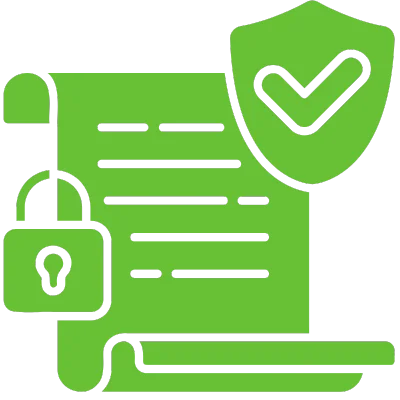
- Regulators: Modernize laws to address automation-specific risks, such as mandating “breakers” that pause bots after significant losses.
- Platforms: Invest in detection tools (e.g., behavioral biometrics) and educate users on bot-related risks.
- Users: Audit bot strategies for ethical alignment. Ask yourself this: Does this tactic harm others? Would I use it manually?
Should You Use a Betting Bot?
Betting bots are dangling a shortcut to profit in front of human players, and they are cold, calculated, and methodical. But beneath the temptation of automation is a host of trade-offs. Do the tools elevate your game or sabotage it? It all hinges on your goals, expertise, and a willingness to negotiate their risks. Next up, we go over the realities of bot-powered gambling.
Who Stands to Gain? Beginner vs. Pro
If you’re a beginner gambler, here’s how a betting bot could possibly help or hurt your game:
- Potential Wins: Bots simplify strategies like matched betting, turning promotional offers into steady, low-risk income.
- Hidden Costs: Relying solely on bots risks stunting your growth. Without a good grasp on why a bet works, you’ll struggle to adapt when conditions change.
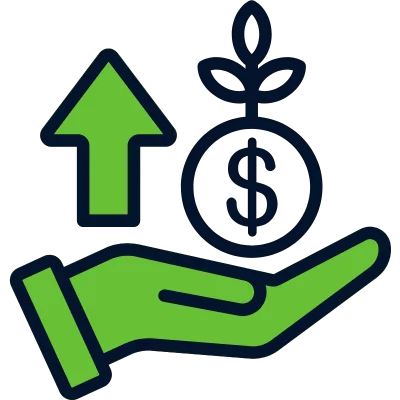
For Advanced Gamblers
- Strategic Edge: Bots handle repetitive tasks (scanning odds, multi-tabling) which means that you can focus on high-level plays like exploiting opponent tendencies.
- Complexity Trap: Sophisticated bots demand technical skill. Misinterpreting data or mishandling settings can turn an edge into a liability.

Main Considerations Before You Go Automated
- Platform Compatibility: Not all bots work everywhere! BetBurger excels in sports arbitrage across 60+ bookies but struggles on crypto casinos.
- Poker bots face detection on gambling sites like PokerStars—they deploy AI to flag any non-human play.
- Verify API access. Platforms like Bet365 will usually block third-party tools, and that forces betting bots to use slower, less reliable browser automation.

Cost vs. Return
- Upfront Investment: Premium bots like RebelBetting cost $150+/month, so you should calculate if your expected ROI justifies the fee.
- Hidden Fees: “Free” bots may monetize your data or lack the most critical features, which will push you toward the pricier tiers.

Reliability & Security
- Opt for the most transparent providers. Open-source bots (e.g., Betfair Bot) let users audit code for fairness and safety reasons.
- Test extensively in demo modes, as a single tiny glitch could misfire bets or expose your financial details to hackers.

Strategy Synergy
Bots do their best in stable environments (pre-match sports betting, low-stakes poker) but tend to flounder in volatility (live dealer games, in-play markets).
- Customize settings to mirror your risk tolerance. A 3% max bet rule prevents catastrophic losses during unexpected swings.

Automation + Human Judgment
Bots are only collaborators—they are in no way replacements. If you want to get the most out of them, do the following:
- Delegate, Don’t Abdicate: Let bots handle all of the data-heavy tasks (odds tracking) while you concentrate on reads and adjustments.
- Stay Alert: Override bot decisions when anomalies pop up—like sudden odds drops that are hinting at insider info or breaking news.
- Audit Relentlessly: Review their performance on a weekly basis! A sports bot’s declining ROI could be a sign of outdated algorithms or tightening bookmaker policies.
Conclusion: Betting on Bots? Mind the Glitch
The emergence of automated betting bots has indeed changed gambling—but not in the way you might be thinking. The tools aren’t here to replace humans—they are here to challenge us, refine our instincts, and force a reckoning with what it means to really master the game.
Look below for a brief refresher on the strengths and limitations of betting bots vs. human gamblers:
| Bots Win At: Speed, data crunching, and grinding repetitive tasks (arbitrage, low-stakes poker). | Humans Win At: Reading bluffs, adapting to chaos, and exploiting psychological cracks. |
| Bots Lose At: Handling surprises (injuries, rule changes) and understanding why a player smirks. | Humans Lose At: Consistency, endurance, and resisting tilt. |
Bots won’t make you a gambling legend, but neither will raw instinct! But if you combine them? You could be untouchable. Play responsibly and hold onto your humanity. Use bots like your car’s GPS—they’ll follow the map, but they can’t drive the car for you. Humans are the ones behind the wheel; one’s not better, but they are inherently different.
The best approach? It’s a hybrid one. Use bots to handle the grunt work (scanning odds and repetitive tasks), but reserve your human judgment for all of the high-stakes reads and creative plays!
FAQs
Of course, you’re curious about betting bots—who wouldn’t be? You might also be skeptical, and that’s fair! That’s why we put together a list of the most frequently asked questions our readers have sent us about these automated lil buggers.
Can Betting Bots Guarantee Profits?
Absolutely not! Nothing can. What they can do is exploit statistical edges (e.g., arbitrage, value betting), but any and all profits hinge on strategy quality, market volatility, and platform crackdowns. Even if you have the best bot ever designed, it’ll experience losing streaks, especially in unpredictable markets like live sports or poker!
Are Betting Bots Allowed on All Gambling Platforms?
Nope! Most mainstream and popular gambling sites like PokerStars, Bet365, and GGPoker ban bots—they deploy AI to detect and ban any and all automated accounts. But there are crypto casinos and unregulated sites that will turn a blind eye—for now.
How Much Do Betting Bots Cost?
It all depends on the betting bot, but here are some of your choices when it comes to price:
Free: Open-source bots (e.g., Betfair Bot) exist but lack support and security.
$50–$200/month: Mid-tier bots like RebelBetting (sports) or GrindBot (poker).
Custom Builds: $1,000+ for tailored solutions (e.g., crypto casino bots).
FYI: There could be hidden costs, like getting your account banned, subscription fees, and possible losses from flawed strategies.
Can Beginners Use Betting Bots Effectively?
Sure! But there are a few caveats. Bots do simplify strategies like matched betting, but beginners will have to do the following:
– Learn core concepts (odds, bankroll management).
– Start with low-risk tactics (e.g., promo abuse).
– Don’t start to over-trust automation.
What Risks Are Associated with Betting Bots?
There are some big risks associated with betting bots (and gambling in general), and they include but are not limited to:
– Detection: Banned accounts and confiscated winnings.
– Financial Loss: Malfunctions or flawed strategies can drain your funds.
– Security: Shady bots might steal data or your payment details.
– Ethical Backlash: Exploiting casual players does harm the gambling ecosystem.
Neural Implants for Real-Time Betting: Sci-Fi or a Future Reality?
We’ve reached a point in tech that is equal parts fascinating and scary—neural implants. Why are we even bringing it up? Because in the not-too-distant future, you could be able to bet on the Super Bowl or a presidential election with your thoughts.
That’s right, you won’t need a computer or a smartphone—just your brain waves. If it sounds like we are describing a movie like Upgrade or The Matrix, you’re not too far off; but it’s not something that was ripped from a cyberpunk novel and neural implants are closing in on reality. The devices, which are made to be a conduit between biology and technology, could someday change how we interact with everything—and that includes gambling.
The question isn’t whether this tech could exist, but should it? Advancements in neuroscience, AI, and real-time data processing are making thought-controlled betting more and more plausible, but the thought of embedding chips in our brains? Um, that’s kinda terrifying if you ask us. We’re talking about merging human cognition with algorithms that predict odds, analyze risks, and will financially profit from our impulses.
And our skepticism is warranted, as companies like Neuralink have already demonstrated that brain-computer interfaces (BCIs) enable monkeys to play video games using their minds. Pair that with AI-driven gambling sites and 5G’s instant connectivity, and the line between sci-fi and reality has disappeared. So, before we hand over our gray matter to Silicon Valley, we need to ask: Are we ready to literally gamble with our brains? And if we are, should we?
Understanding Neural Implants
Okay, so neural implants, which were once the stuff of dystopian fiction, are now very real, albeit still very experimental, devices. Basically, the implants are brain-computer interfaces (BCIs): tiny electrodes or chips that interact with neural signals, translating the brain’s electrical activity into digital commands. It’s kinda like a Bluetooth but for your brain, and instead of connecting to headphones, it links directly to software, apps, or other people’s devices.
The Pioneers in Brain-Computer Interfaces
Yes, the concept sounds futuristic, but companies like Neuralink, which was founded by Elon Musk, are already testing out prototypes. Their implant, which is about the size of a coin, aims to help paralyzed individuals control external devices with their minds. In 2021, Neuralink showcased a monkey playing the video game Pong using only its thoughts. The innovators, like Synchron and Blackrock Neurotech, are developing less invasive alternatives—like BCIs that sit in blood vessels or on the brain’s surface—to avoid risky open-skull surgical procedures (yeah, no thanks).
Real-Time Data: From Brain to Bet
The critical factor that’s enabling thought-driven applications? Speed. Modern BCIs can process neural signals in milliseconds, and 5G networks and AI-powered algorithms handle data transmission and analysis pretty much instantaneously. This opens the door to scenarios where a passing thought—say, “Bet $250 on black”—could trigger a real wager before you consciously make the decision.
It’s this very speed that raises some thorny questions. If neural implants can act on impulses faster than our own self-awareness, who—or what—is really in control?
The Intersection of Neural Implants and Betting
A marriage between neural implants and gambling all hinges on one simple word: immediacy. By bypassing the physical devices and manual inputs, the interfaces would enable bets to be placed at the speed of thought. That sounds cool and convenient, but is it? It’s a huge change in how human beings interact with risk, chance, and the algorithms that profit from both aspects.
Neural implants could eliminate the friction between intention and action. A user watching a horse race, for instance, might instinctively “think” a bet as the final stretch unfolds. The implant detects their neural signals, interprets the intent, and executes the wager via a linked betting platform—all before the race ends. It takes away any kind of delay that comes from typing, tapping, or voice commands.
In fast-paced betting markets—like in-play sports or live casino games—milliseconds really matter. Neural signals travel faster than fingers can swipe, which would give the users who have implants an edge over the bettors who don’t. And for high-stakes gamblers, this could mean capitalizing on odds shifts or last-minute game developments before others have the chance to react.
Pairing neural data with AI-driven betting platforms raises the stakes even further. How? Because implants would be able to feed real-time biometric data—like adrenaline spikes or subconscious risk assessments—into algorithms that change odds or recommend bets. There could be a system that knows you’re feeling confident during a poker hand and nudges you to raise, and it’s all based on your brain.
But hold up! A seamless integration like this comes with a ton of risks. If a device can act on our subconscious impulses or preconscious thoughts, where does smart decision-making end and automated exploitation begin? The allure of speed will most likely come at the cost of our autonomy—it’ll turn our noggins into unwitting collaborators with the house, and the house always wins.
Technological Feasibility: How Close Are We Really?
The whole idea of thought-driven betting relies on three pillars: hardware capable of reading brain activity, software that deciphers it accurately, and an infrastructure that is fast enough to act on it. And although progress is accelerating, each pillar is up against its own hurdles—and not all in them are purely technical.
The Current State of Neural Implants
Companies like Neuralink, Synchron, and Blackrock Neurotech are dominating the BCI landscape, but all of their goals are different. Neuralink’s fully implantable device targets medical applications like restoring mobility, and Synchron’s stent-like “Stentrode” focuses on enabling paralyzed patients to control digital devices via blood vessels. Blackrock’s Utah Array, a microelectrode grid, has been used in research for decades. All of these devices can interpret basic motor commands (e.g., moving a cursor), but translating abstract thoughts—like betting intent—is still uncharted territory.
The Hurdles of Real-Time Processing
Even the most advanced BCIs struggle with two bottlenecks: specificity and latency. Neural signals are noisy, and isolating the exact intent to “place a bet” from the brain’s background activity is like trying to identify one voice in a packed stadium. Current systems also operate with slight delays, which could be catastrophic in fast-moving betting scenarios. A lag of 500 milliseconds? That could mean missing the window to bet on a goal in soccer.
Breakthroughs
Recent advances do suggest that some solutions are coming to the fray, like machine learning models, which are trained on vast neural datasets. They are getting much better at predicting intent from sparse signals. In 2023, researchers at Stanford used AI to decode attempted handwriting motions from paralyzed patients with 94% accuracy. Companies like Paradromics are developing high-bandwidth implants that process data 100x faster than any earlier models. Wireless BCIs, like those from Precision Neuroscience, want to decrease surgical risks, which in turn make consumer applications more viable.
Still, these are very early days. While the tech is baby-stepping toward plausibility, the leap from medical tools to seamless, consumer-ready betting interfaces all hinges on solving the ethical dilemmas as much as engineering ones. Because decoding, “I really want a cheesesteak” is one thing. Interpreting “I’ll risk $1,000 on this blackjack hand?” That’s another thing entirely.
Ethical and Regulatory Concerns
The thing with neural implants in betting isn’t only a technical challenge—it’s an ethical nightmare. From privacy breaches to the erosion of personal agency, the stakes extend way beyond financial loss. Next up, we take a look at what probably keeps ethicists, regulators, and some developers up at night.
Privacy: Who Owns Your Thoughts?
Neural implants generate a constant stream of data, including our subconscious impulses and emotional states. If gambling sites have access to this kind of info, they could exploit vulnerabilities in real time—say, targeting users when they’re emotionally vulnerable or tired. And the scariest thing? Hacked neural data could expose intimate details, like risk tolerance or decision-making patterns, to malicious actors. The question isn’t just about data security but if anyone should have access to the raw feed of a human mind.

Addiction on Autopilot
The ease at which we can bet already fuels addictive behaviors, and with neural interfaces, placing a wager would be as effortless as blinking. The lack of any physical friction—no wallet, no app, no confirmation screen—could take away the last barriers to impulsive gambling. Platforms might even be able to leverage the neural data to identify and exploit addictive tendencies and then tailor odds or incentives that are based on a user’s brain activity. Responsible gambling tools, like spending limits, would need to evolve in radical ways to keep up.
Regulation: Playing Catch-Up
Current gambling laws just aren’t equipped to handle thought-driven wagers, and they may never be. How do you actually prove consent when a bet is placed via neural signal? Can algorithms be audited to guarantee that they don’t manipulate users’ decisions? Regulatory frameworks would need to mandate transparency in how neural data is used, enforce strict consent protocols, and penalize any predatory practices. Some experts are arguing for “neuro-rights” legislation, which would treat neural data as a protected category akin to how HIPAA does with medical records.
The way forward will take so much more than innovation—it will take solid guardrails. Without the strongest ethical standards and oversight, neural betting could turn brains into profit-driven algorithms that will outmaneuver our human judgment.
Potential Benefits and Risks for the Gambling Industry
Neural implants could absolutely propel the gambling industry into a new era of innovation—or plunge it into uncharted chaos. For operators, there’s the pull of faster transactions, better user engagement, and untapped markets; that’s just an undeniable fact. But lurking beneath the opportunities are hazards that could erode consumer trust, bring regulatory crackdowns, and expose vulnerabilities that are ripe for exploitation. The industry’s ability to walk this tightrope if and when it comes to fruition—like harnessing the tech’s possibilities without succumbing to its darker implications–will have a huge role in its future relevance. The following are the very real benefits and the very real risks that come with this territory!
Benefits
For gambling platforms, neural interfaces would be a chance to redefine user engagement and revenue streams totally.
| Benefit | Details |
|---|---|
Frictionless Interaction | Eliminating the need for screens or physical inputs could super-streamline betting, and that would attract tech-savvy users who want speed and convenience. A seamless experience could also convert casual bettors into frequent users. |
Hyper-Personalization | Neural data could let platforms tailor odds, rewards, and marketing in real time. For example, detecting a user’s excitement during a basketball game could trigger targeted live-betting offers, which would boost engagement. |
Market Expansion | Thought-driven betting could open up entirely new demographics, like people who have physical disabilities and struggle with traditional interfaces, which would broaden the industry’s reach. |
Risks
The very same features that make neural betting so lucrative? Well, they also expose the industry to unprecedented dangers and we aren’t being dramatic.
| Risk | Details |
|---|---|
Security Nightmares | Neural implants create a heavenly scenario for hackers. A breach could expose sensitive neural data—like subconscious biases or emotional triggers—to manipulation or even blackmail. |
Systemic Exploitation | Malicious actors might hijack implants to make unauthorized bets or skew outcomes. Insider threats, like rogue employees altering algorithms, could undermine trust in betting platforms. |
Regulatory Blowback | Public backlash over privacy violations or addiction risks would very likely trigger harsh regulations, which would stifle innovation or shrink profit margins. |
The Survival of Traditional Platforms
If this comes to fore, the legacy betting companies will face existential pressure to adapt. Some could possibly partner up with BCI developers to stay relevant, and the ones that don’t? They risk becoming obsolete. Not to mention the smaller operators who would be unable to afford neural tech—they could lose market share to tech giants like Meta or Apple, and that would ramp up the industry’s consolidation.
The gamble here isn’t only a financial one—it’s also whether an industry that is built upon risk can responsibly navigate a future where our brains turn into the floor of a casino.
Is This the Future of Betting or Just Sci-Fi?
The concept of neural implants for gambling sits at the crossroads of ambition and reality. On paper, the pieces are falling into place: brain-computer interfaces (BCIs) are advancing, AI gets more sophisticated by the day, and the gambling industry is always hungry for innovation. But how much of this vision is grounded in today’s science, and how much is speculative fiction? Below, we separate the hype from actual possibility.
Current Tech vs. The Vision
Today’s BCIs excel at decoding basic motor commands—like moving a cursor or a robotic arm—but they struggle with abstract intentions. Neuralink’s primate experiments or Synchron’s stroke-patient trials focus on restoring lost functions, not facilitating complex decisions like with betting. The jump from “move left” to “bet $250 on Team A” all depends on interpreting nuanced cognitive patterns, a challenge neuroscientists are still grappling with. For betting-specific implants to work, devices would need to distinguish impulsive thoughts from deliberate intent, and that’s a frontier that even the best labs haven’t breached.
Expert Predictions: Optimism vs. Skepticism
- Proponents like John Donoghue, a pioneer in neurotechnology, argue that BCIs could evolve beyond medical use within 20–30 years. Startups like Neurable already market non-invasive headsets for basic brain-controlled gaming, which hints at a path toward consumer adoption.
- Critics, however, highlight ethical and technical roadblocks. Dr. Anna Wexler, a bioethicist at UPenn, warns: “Translating ‘I want to bet’ into a reliable neural signal isn’t just a coding problem—it’s a philosophical one. Where does the brain end and the algorithm begin?”
Research Accelerating the Timeline
Big breakthroughs suggest that the progress isn’t stagnant. Projects like the BrainGate Consortium have demonstrated rapid decoding of handwriting intent from neural signals. Meanwhile, AI models like OpenAI’s GPT-4 show an eerie proficiency in predicting human behavior, which could pair with neural data to anticipate betting choices. DARPA’s Next-Generation Nonsurgical Neurotechnology (N3) program has the goal of developing non-invasive, high-resolution BCIs, and that would be a super important step for mass adoption.
So, is neural betting inevitable? Nope, not yet! But there are billions of dollars that are flowing into neurotech and AI, and that means that the gap between sci-fi and reality is narrowing. Once again, the question isn’t “Can we?” but “Should we?”—and whether or not society will accept a world where the casino literally lives in our heads.
What It Means for Gamblers: Practical Implications
Neural implants could radically alter not just how bets are placed but how gamblers interact with risk itself. From split-second decisions in live sports to AI-guided poker strategies, the very nature of gambling—as a combo of luck, skill, and psychology—could be rewritten. The following is how everyday bettors would experience this shift!
Redefining Sports Betting, Casinos, and Financial Wagering
- Sports Betting: Reacting to a fumbled football catch as it happens, placing a live bet through a neural impulse before the play even ends. Delays caused by app load times or distracted scrolling vanish, turning spectators into hyper-responsive participants.
- Casino Games: In poker, neural interfaces could enable real-time “tells” detection, analyzing opponents’ subconscious micro-impulses (e.g., hesitation before a bluff) through linked implants. Blackjack players might receive instant probability calculations via augmented reality overlays, fed directly into their visual cortex.
- Financial Wagering: Betting on cryptocurrency fluctuations, commodity prices, or economic indices could happen reflexively. A gambler tracking Bitcoin’s volatility, for instance, might place a spread bet the moment their brain registers a trend shift—no screens or manual inputs required.
Skill-Based Gambling: Sped Up
Neural implants could turn gambling into a contest of neural agility. Games like esports betting or live trivia, where milliseconds determine outcomes, might favor users with faster brain-to-device latency. Over time, a “neuro-advantage” divide could emerge, similar to how high-frequency trading dominates stock markets. Competitions might even require participants to use standardized implants to level the playing field—turning gambling into a cyborg sport.
Real-Time Feedback
Implants could offer gamblers something unprecedented: a live dashboard of their cognitive biases. Think of it as a Fitbit for betting habits. Sensors might alert users when stress hormones spike during a losing streak, nudging them to pause. AI coaches could analyze neural patterns to flag impulsive bets or recommend strategies based on past successes.
But this raises a paradox: If algorithms optimize every decision, does gambling lose its soul—the thrill of uncertainty?
Neural tech does hold the promise of control but threatens autonomy for players. The line between skilled play and algorithmic dependency will blur, and that leaves us (and gamblers) to wonder if they are still betting, or is the bet placing itself?
Conclusion: Cashing in on Your Cortex
If the idea of betting with your mind sounds like a good idea, we totally get it! Just think it, and it’s a done deal. And although we agree that it’s an interesting idea, it’s also creepy to realize that it could be done. But it’s gonna be a hard “no” on the open brain surgery for us.
Let’s do a quick recap on the possible impact that neural implants could have on real-time betting:
- The Good: Instantaneous bets, hyper-personalized odds, and a sci-fi edge that could make you feel like you’re Neo in The Matrix.
- The Bad: Your brain data becomes the hottest commodity since Bitcoin, and addiction rates shoot up faster than a SpaceX rocket.
- The Ugly: Hackers, rogue algorithms, and the existential dread of wondering if that “gut feeling” was ever really yours in the first place.
Right now, neural betting is straddling the fence somewhere between “Cool story, bro” and “OMG, it’s happening.” Tech giants are racing toward BCIs, AI is getting scarily intuitive, and the gambling industry loves a shiny new toy. While we’re not quite at Black Mirror levels (yet), shrugging this off as a pure fantasy feels a little bit naïve—like when we all assumed that social media would never sell our data.
Here’s our advice: Be curious, stay really skeptical, and maybe keep your wallet (and your skull) on lockdown. Because if history has taught us anything, it’s that humanity will bet on absolutely anything—even its own obsolescence.
FAQs
Our neurons are on high alert after all of that, and we know that yours probably have some more questions—maybe even an ookie sense of existential dread. Look below for the FAQs that our readers have asked about neural implants!
What Are Neural Implants, and How Do They Work?
Okay, so just think of them as weird little brain buddies that eavesdrop on all of your neurons. The devices (BCIs) intercept the electrical signals in your skull and translate them into commands for computers. And no, you can’t pair them with AirPods…yet.
Could Neural Implants Really Be Used for Betting?
In theory, sure! But that’s only if you’re cool with letting Silicon Valley monetize your neurons. Today’s BCIs help paralyzed people type. Tomorrow’s? Maybe they’ll let you bet your life savings on a hockey game while you type.
How Close Is This Technology to Becoming a Reality?
It’s closer than your last bad beat at poker, but it’s light-years from mainstream use. Neuralink’s monkey can play “Pong.” Your grandkids might get to bet on “Pong” by only using their thoughts.
Are There Risks Associated with Using Neural Implants for Gambling?
Only if you consider brain hacking, addiction turbochargers, and corporations owning your impulses to be “risks.” Seriously, algorithms would be able to turn your emotional crisis into a revenue stream. Don’t say we didn’t warn you!
How Might Neural Implants Change the Gambling Industry?
It would be like Las Vegas, but in your head. Faster bets! Personalized losses! And if and when it finally happens? Regulators will be too busy Googling “What’s is a neuron?” to stop it.
How to Turn Free Bets and Casino Bonuses into Real Cash
If you have ever gambled online, you’ve definitely seen a casino bonus or free bet offer pop up, and it feels like you’ve hit it big. FREE money? Where do I sign? Not so fast—the offers aren’t exactly cut and dried. They come with a lot of strings attached! You didn’t think that gambling sites and sportsbooks just dole out cash without a game plan of their own, did you? Awww, you did. But most people do, so don’t feel bad! The platforms are actually counting on people getting lost in all of the rules, missing a deadline, or betting recklessly.
That doesn’t mean you can’t win, though! As a matter of fact, if you go at it the right way? These bonuses are a reliable way to pad your bankroll. You can game this system, and we are going to give you a step-by-step guide on how to do it!
Our guide will be your trusty compass, and we’ll decode the complicated jargon that’s in the terms and conditions, how to meet those pesky wagering requirements and spot high-value bonuses, minimize risks, and squeeze every last drop out of promotions. Want to stop leaving money on the table? Let’s go!
Understanding Free Bets and Casino Bonuses
You can look at free bets and casino bonuses as a sort of “sample platter” of online gambling. They let you taste some of the action without emptying your wallet—but only if you know exactly what you’re biting into! Some are good deals, and others have some hidden ghost peppers that you’ll find unpleasant. Below, we break down what’s on the menu so that you don’t burn the inside of your mouth.
What Are Free Bets and Casino Bonuses?
We need to start out with the basics—because confusing a free spin with a deposit bonus is like mixing up a unicycle with a Harley Davidson.
Free Bets
These are exactly what they sound like: risk-free bets handed out by sportsbooks. Place a wager, and if it loses, you’re out nothing. If it wins? You pocket the profit (but usually not the stake). Example: Bet $10 on a football game “for free”—keep the $15 profit if it hits.
Casino Bonuses
- Deposit Bonuses: Match your deposit with bonus cash (e.g., “100% up to $200”). Deposit $100, get $100 extra to play with.
- No-Deposit Bonuses: Free cash just for signing up. No strings? Not quite—there’s *always* strings.
- Free Spins: Play slots without dipping into your balance. Great for testing new games.
- Cashback Offers: Get a percentage of losses back. It’s like a small consolation hug after a really bad day.
Main Difference
Free bets are straightforward (win or lose, you’re done). Casino bonuses? They’re sagas. You’ll need to wager the bonus (and sometimes your deposit) multiple times before you can cash out.
Common Terms and Conditions to Watch Out For
Terms and conditions are always where online casinos and sportsbooks hide the booby traps. Skip this section, and you’re basically gambling while you’re blindfolded.
- Wagering Requirements: A “30x” requirement means you must bet *30 times the bonus amount* before withdrawing. Example: A $10 bonus requires $300 in total bets. Pro tip: Lower multipliers (like 10x) = better odds of cashing out.
- Minimum Odds Restrictions: Free bets almost always require you to bet on odds of -200 or higher. Translation: No dumping your freebie on a “sure thing” with -1000 odds.

- Max Winnings/Withdrawal Limits: That “$500 no-deposit bonus” might cap withdrawals at $100. Always check the fine print before taking a celebratory lap.
- Expiration Dates: Bonuses aren’t fine wines—they don’t get better with age. Miss the deadline (usually 7-30 days), and your offer goes *poof*.
- Restricted Games: Some bonuses only work on specific slots or table games. Bet on blackjack when it’s “slots-only”? Your progress goes bye-bye.
Strategies to Maximize Free Bets and Convert Them into Cash
Now, we are getting to the good stuff! Free bets and bonuses are just tools, but if you use them wisely? They’ll build your bankroll. Use them recklessly? Well, they’ll vanish quicker than a pigeon who stole your soft pretzel. Next up, we break down the proven strategies that will turn these offers into real cash—and luck has nothing to do with it!
Matched Betting (Risk-Free Strategy)
Matched betting is the ultimate “no-sweat” method for converting free bets into a guaranteed profit. It’s not gambling—it’s literally math. By covering all possible outcomes of a bet, you eliminate any risk and lock in profit.
Here’s How It Works:
- Place a Back Bet: Use your free bet to wager on an outcome (e.g., “Team A wins”).
- Place a Lay Bet: Bet *against* the same outcome on a betting exchange (e.g., “Team A doesn’t win”).
This way, no matter what happens, you profit.
Step-by-Step Example (Using a $20 Free Bet)Step 1: Find an event with high odds (e.g., 5.0 on a basketball game).
Step 2: Use your $20 free bet to “back” Team A at 5.0. If they win, you earn $100 (5.0 x $20). If they lose, you lose nothing (since it’s a free bet).
Step 3: “Lay” Team A on a betting exchange. Calculate the stake needed to offset your potential $100 profit. For example, lay $24 at odds of 4.0. If Team A loses, you keep the $24 lay profit. If they win, your lay bet covers the $100 profit, leaving you with a small net gain.
The following are the tools that you’ll need for this:
- Odds Comparison Sites: Platforms like OddsChecker help find high-value bets.
- Betting Exchanges: Use Betfair or Smarkets to place lay bets.
- Matched Betting Calculators: Tools like ProfitDuel do the math for you.
And here’s why it works:
- Zero reliance on luck.
- Converts free bets into ~80% of their value (e.g., a $20 free bet ≈ $16 profit).
Betting on Low-Risk Outcomes
Don’t be naive or be fooled into thinking they are bets are the same—far from it! Some are volatile (like slot machines), and others are predictable. If you focus on the latter, you’ll be able to grind out regular wins.
Best Low-Risk Bets
Sports Betting
- Over/Under Goals in Football: Target matches with strong defensive teams.
- Moneyline Favorites in Tennis: Top-ranked players win ~80% of their matches.
- Handicap Bets: Level the playing field (e.g., “Team A -1.5 goals”).
- Casino Games
- Blackjack: With perfect strategy, the house edge drops to 0.5%.
- Roulette (Even-Money Bets): Bet on red/black or odd/even (48.6% win chance).
- Baccarat: Stick to the “banker” bet (house edge: 1.06%).
Rolling Over Winnings
- Start small. Use your bonus to place low-risk bets.
- Reinforce profits: After a win, set aside a portion of the profit and reuse the rest to meet any wagering requirements.
- Don’t chase losses—stay with your strategy.
Here’s a Good Example of a Low-Risk Bet– You have a $50 casino bonus with a 30x wagering requirement ($1,500 total bets needed).
– Play blackjack with $5 bets. Assuming a 49% win rate, you’ll lose ~$25 but meet the requirement.
– Withdraw the remaining $25 as profit.
Finding Loopholes and Exploiting Promotions
Online casinos aren’t perfect, and the promotions on offer usually have some loopholes that you can exploit—but only if you know what to look for and where to look!
Target ‘No-Wagering’ Bonuses
These are rare but golden. No-wagering free spins or cash bonuses let you withdraw winnings immediately.
- Where to Find Them: New casinos (e.g., Vegas Rush, PlayOJO) often offer no-wagering deals to attract players. Look for promotions labeled “cashback with no playthrough.”
Stack Bonuses Across Multiple Casinos
Sign up at 10+ casinos that offer no-deposit bonuses (e.g., $10-$30 each) and use matched betting or low-risk games to convert each bonus. For example, 10 casinos x $20 bonuses = $200 of potential profit.
Reload Bonuses & VIP Perks
- Reload Bonuses: Weekly/monthly offers for existing players (e.g., “50% up to $100”). Use these to boost your bankroll.
- VIP Programs: High rollers get personalized bonuses, faster withdrawals, and loss rebates.
Exploit ‘Free Bet’ Loopholes
- Arbitrage Betting: Use free bets to cover one side of a surefire arbitrage opportunity.
- Betting Exchanges: Convert free bets into exchange credit (some gambling sites do allow this).
Timing Is Everything
- Holiday Promotions: Christmas, Super Bowl, and Grand National events come with the best offers.
- Midweek Lulls: Casinos usually will boost bonuses on the quieter days (like Tuesdays/Wednesdays).
Here’s how you can take advantage of the loopholes:
- Casino A offers a $50 no-deposit bonus with 20x wagering.
- Casino B offers a 100% deposit match up to $200.
- Use Casino A’s bonus to grind blackjack, meet wagering, and withdraw $40.
- Deposit $200 into Casino B, get a $200 bonus, and repeat.
Strategies for Converting Casino Bonuses into Real Money
Casino bonuses are like a bank vault—except the vault is locked, and the code is hidden among a minefield of rules. Want to crack it open? For this part, you’ll need more than luck. The following are the tactics that will help you turn bonus play money into cold, hard cash, starting with the games that you play, the bets that you make, and the art of cashing out without getting ghosted by the casino!

Choosing the Right Casino Games
Picking the right game is like choosing between a golf cart and a Porsche for a drag race. One will get you to the finish line; the other one will putter out and leave you broke.
– Blackjack: With perfect basic strategy, the house edge drops to 0.5% or lower. Translation: For every $100 you bet, you’ll lose about 50 cents on average.
– Baccarat: Bet on the “Banker” (house edge: 1.06%) and avoid the “Tie” bet (14% edge). Simple, slow, and steady.
– Video Poker: Games like *Jacks or Better* (99.5% RTP) let you play nearly even against the house. Pro tip: Learn the pay tables—some versions have better odds.
– European Roulette: Stick to even-money bets (red/black, odd/even). The single zero cuts the house edge to 2.7%, unlike American roulette’s 5.26%.
– Slots with Low RTP: A 92% Return to Player (RTP) means the casino keeps 8% of every dollar you bet. Aim for slots with 96%+ RTP (e.g., *Starburst*, *Blood Suckers*).
– Keno/Sic Bo: House edges can soar to 25-30%. These are lottery tickets, not investments.
– American Roulette: That double zero is a silent but deadly killer.
– Slots: Look for RTP in the game’s info section or Google “[Game Name] RTP.”
– Table Games: Research strategy guides (e.g., Wizard of Odds) for house edge stats.
Smart Wagering Strategies
Meeting wagering requirements doesn’t have much to do with speed—it needs to be slow and steady. Bet too big? You’ll blow your balance. Bet too small? You’ll fall asleep before you can cash out.
– Rule of Thumb: Bet 1-2% of your bonus balance per wager.
– Example: For a $100 bonus, bet $1-$2 per hand/spin.
– Why? Smaller bets stretch your bankroll, letting you survive variance (those brutal losing streaks).
– Reverse Martingale: Double bets after wins, reset after losses.
– Example: Bet $1 on blackjack → Win → Bet $2 → Win → Bet $4.
– Use this ONLY on low-edge games, and quit while you’re ahead.
– Flat Betting: Keep bets consistent. Boring? Yes. Effective? Absolutely.
– Set a Loss Limit: If you lose 20% of your bonus, stop and walk away.
– Set a Win Target: Hit a 50% profit? Cash out. Greed is the fastest way to lose.
Cashing Out Strategies
Cashing means that you have hit the final boss level. Beat it, and the money’s all yours. Fail, and you’ll rage-quit faster than a tween who just lost a Fortnite match.
– Track Your Progress: Use a spreadsheet or your notes app to log bets. Example: $1,000 wagering requirement → $10 bets = 100 bets needed.
– Verify Game Contributions: Some games count 10-20% toward requirements. Slots usually count 100%, and blackjack only 10%. Check those T&Cs!
– Incremental Withdrawals: Withdraw 50% of your balance first, then the rest. Casinos sometimes flag large, sudden withdrawals.
– Avoid Bonus Abuse: Don’t deposit, claim a bonus, and withdraw immediately. Casinos will notice and could ban you.
– Betting Over Max Limits: If the max bet is $5 during bonus play, a $6 wager cancels your bonus.
– Expired Bonuses: Let the clock run out? You can kiss your progress goodbye.
– Playing Restricted Games: Accidentally fired up an excluded slot? Your wagering progress resets to zero.
– Fastest Options: E-wallets (PayPal, Skrill, Neteller) process in 24 hours.
– Slowest Options: Bank transfers (3-5 business days) and checks (up to 10 days).
– Avoid Crypto for Withdrawals: Some casinos convert crypto withdrawals to cash at really terrible rates.
Most Common Issues to Avoid
Okay, we need to talk about the huge elephant in the casino log-in lobby: bonuses are designed to trip you up. They’re kinda like a ladder, but half of the rungs are missing—climb up carelessly, and you’ll fall straight into the misery of “Why did I even bother?” Next up, we’ll unpack the four biggest mistakes that players make (and how to evade them like a pro).

Not Reading the Fine Print Before Claiming a Bonus
Claiming a bonus without reading the terms is like accepting a marriage proposal from a random stranger you met on the internet. Sure, it might work out—but you’re most likely signing up for a lifetime of regret.
– Wagering Surprises: That “200% deposit bonus” might require you to bet 50x the bonus + deposit. Do the math: a $100 bonus + $100 deposit = $200 x 50 = $10,000 in bets before cashing out.
– Game Restrictions: Slots might count 100% toward wagering, but blackjack could contribute 10%. Bet on the wrong game, and you’ve wasted hours.
– Expiration Dates: “Use within 7 days” isn’t a suggestion—it’s a hard deadline.
– Skim the T&Cs for these keywords: wagering requirements, game weighting, max bet, and expiry date.
– Use a highlighter (or a notes app) to flag any deal breakers.
Betting on High-Risk Games That Contribute Little to Wagering
High-risk games are the casino’s Trojan horse. They lure you in with their graphics and huge jackpot promises and then proceed to obliterate your balance before you can meet wagering requirements.
– Slots with Low RTP: A 92% RTP slot keeps 8% of every bet. Play 100 spins at $1, and you’ll lose $8 on average.
– Roulette (Unless You’re Strategic): Betting on single numbers has a 2.7% house edge in European roulette, but the volatility will drain your balance faster than a leaky bucket.
– Keno/Sic Bo: These are the carnival games of the casino—fun but statistically hopeless.
If a game only contributes 10% to wagering (like blackjack at some casinos), a $100 bet only counts as $10 toward requirements. You’ll need 10x more bets to cash out.
How can you fix this? By sticking to the games that combine low house edge and high wagering contribution, like the following:
– Slots with 96%+ RTP (check reviews).
– European roulette (even money bets).
– Baccarat (banker bets).
Chasing Losses and Over-Betting Beyond the Bonus Amount
Chasing losses is the gambler’s version of digging a hole in the sand near the ocean. No matter how hard you try, it keeps filling up with water.
– You lose a few bets, panic, and double your wagers to “win back” losses.
– The next thing you know, you’ve burned through your bonus and your deposit.
– Emotion Over Logic: Fear of losing the bonus can sometimes override any rational strategy.
– Misunderstanding Variance: Even low-edge games have losing streaks.
– Set Limits: Decide upfront: “If I lose 30% of my bonus, I quit.”
– Use a Betting Calculator: Tools like BonusBank track wagering progress and warn you when to stop.
– Stick to Flat Bets: No doubling down after losses—always be consistent!
Using Multiple Accounts (Which Can Get You Banned)
Sure, creating five different accounts to claim the same bonus five times sounds like a clever move—until the casino’s fraud team freezes all of your accounts and keeps your winnings.
– Bonuses are meant for new or loyal players, not serial opportunists.
– They track IP addresses, device IDs, and payment methods.
– Confiscated Winnings: Casinos void profits and will keep your deposit.
– Blacklisting: You will get banned from the entire platform (and its sister gambling sites).
– One Account Per Household: Casinos allow one account per person/address.
– Read Promo Terms: Some bonuses allow multiple claims (e.g., weekly reloads).
Conclusion: Flip Bonuses into Bankroll
Look, bonuses aren’t a golden ticket, but they’re not a mirage, either! The difference between you profiting and losing lies in how you treat the offers. It should be a calculated challenge—not a careless toss of the dice.
Look below for a bite-size debrief on the main takeaways from above:
Why Most Players Fail (And How You Won’t)
- They skip the rulebook: Wagering requirements aren’t “fine print”—they’re the entire game. Ignore them, and you’re donating your time to the casino.
- They play games that aren’t low-risk: Slots are designed to erase your balance. Blackjack and baccarat? They’re negotiable.
- They treat bonuses like Monopoly money: Betting your entire bonus on red? That’s not a strategy. That’s a fireworks show—bright, loud, and gone in mere seconds.
Your Profit Playbook
- Track EVERYTHING: Use a spreadsheet, an app, or a napkin. If you don’t know your wagering progress, you’re lost.
- Bet small, win often: Wagering $1,000 with $5 bets isn’t glamorous. But neither is losing your bonus in three spins.
- Cash out early, cash out often: Casinos absolutely love the players who “let it ride.” Be the player who dips after making a 20% profit.
Bonuses aren’t free money—they’re a test! And you can pass it by outsmarting the system. But make no mistake: You’ll fail it if you act like you’re invincible.
Turning bonuses into real cash has little to do with luck—it’s mostly about discipline! Play smart, cash out smarter, and never bet more than you can afford to lose.
Gambling’s really fun—until it isn’t. So always set deposit limits, take breaks, and never let a bonus dictate your gaming choices. Profit is optional; gambling responsibility isn’t.
Want to put these strategies to work? Check out GamblingSite.com for vetted bonus offers, expert guides, and tools that you can use to maximize your wins. The house doesn’t always have to win—if you know how to play!
How to Use a Poker HUD to Improve Your Online Poker Strategy
You’re at an online poker table on your fav gambling site, and the player who is two seats to your left keeps raising preflop like they’re actually deathly allergic to folding. Are they a disciplined pro or a reckless gambler who someone might need to stab with an Epi-pen if they go into anaphylactic shock? Without any insider intel, it’s all a guessing game—that is, unless you’ve got a Poker HUD up your sleeve.
What’s a Poker HUD? It stands for “Heads-Up Display,” and it can be your own personal poker lab. It dissects every hand, every bet, and every opponent’s tic to serve up t he data like a mad scientist would hand over lab results. And it’s not just number-crunching, no sir; it’s also about seeing any leaks in your game and exploiting the weaknesses in others. And in an online world where pixels sometimes replace real poker faces, a HUD is your BFF if you want to play smarter, not harder.
If you are ready to stop playing with your cards face up, we can be of service—we’ll tell you how you can turn raw data into a solid ally by using a HUD to level up your online poker strategy. Deal? Deal!
What Is a Poker HUD and How Does It Work?
Alright, first up we need to figure out what a Poker HUD is and how it works! Basically, it’s software that beams important stats about your opponents onto your screen during a game. You could say it’s akin to playing poker with X-ray vision—except instead of seeing the other players’s cards, you will see habits, tendencies, and holes in your rivals’ strategies.
This is how it works: As you are playing, the HUD is silently analyzing hand histories from your current session (and previous ones, if you’ve got the data). It calculates metrics like VPIP (how loose someone plays), PFR (how aggressive they are pre-flop), and Aggression Frequency and then displays these numbers right next to each player. Now, “BluffBuster69” doesn’t seem so intimidating when you know they fold to river raises 75% of the time!
Tools like PokerTracker 4, Hold’em Manager 3, and DriveHUD are the engines behind all of this intel. They sync with your poker client, thereby tracking thousands of hands to build profiles on your opponents. It’s like having a team of minions who are taking notes on everyone’s habits—except these minions don’t sleep, never miss a detail, and they work for free after the initial buy-in.
How does it all work? We swear there is no hocus-pocus at hand—it’s just code. The HUD reads hand histories, processes trends, and serves up insights quicker than you can say, “ugh, bad beat.” You can concentrate on honing your strategy; the software will handle the spreadsheets. It’s like having a trusty golf caddie that gives you good intel, like, “They always miss putts to the right.” Only this “caddie” resides in your computer or device.
Key HUD Statistics and What They Mean
It’s hard to see through the fog of poker terms and jargon—there’s a lot to remember! That’s where HUD stats come in handy—they’re like subtitles for your opponents’ strategies, and they translate sneaky or cryptic moves into plain English. The following is your secret decoder ring for the metrics that separate the clueless from the clairvoyant in the game of poker!
| Metric | Details |
|---|---|
VPIP (Voluntarily Put Money in Pot) | This tracks how often a player will jump into the action preflop—calling or raising instead of folding. A high VPIP (say, 35%+) shouts out, “I’ll play any two cards!” and a low VPIP (under 15%) signals a nit who only shows up when they have premium hands. Spotting this tells you who you can bully with bluffs and who you should not mess with unless you’ve got the goods. |
PFR (Pre-Flop Raise) | PFR measures their enthusiasm for starting out strong. If someone’s PFR is nearly as high as their VPIP, they’re aggressive (like raising with an A-5 offsuit). If it’s way lower, they’re a passive caller who is waiting for monsters. You can use this to identify who’s controlling the table and who’s in the passenger seat during the ride. |
AF (Aggression Factor) | This gives you the tea on how a player handles the post-flop drama. Calculated as (bets + raises) / calls, a high AF (3+) means they’re firing bullets at every opportunity, and a low AF (1.5 or less) means that they’re folding or calling like they’re terrified of their own shadow. You can adapt and adjust by ramping up your aggression against passivity and tightening up against maniacs. |
3-Bet Percentage | How often do they re-raise pre-flop after someone else raises? A 3-bet stat above 8% means they’re either a totally fearless pro or a loose cannon. Below 4%? They’re folding to pressure like a Dollar Store lawn chair. You can exploit them by 3-bet bluffing the timid players and respecting the fearless ones. |
Fold to 3-Bet | This reveals what kind of backbone they have when they’re facing a re-raise. If they fold 70%+ of the time, they’re practically begging you to 3-bet them into oblivion. If they’re under 50%, save your bluffs—they’re calling stations, and they have a doctorate degree in stubbornness. |
Fold to CBET | This lil’ beauty exposes their flop resilience. If they fold 60%+ to cbets, keep shooting like you’re paid by the bet. If they’re calling or raising most cbets (under 40%), pick your spots—they’re either sticky or setting up traps. |
Setting Up Your Poker HUD for Optimal Performance
A great HUD doesn’t mean that you should overload your screen with numbers—it should surface the right data at the right time. It should look like a minimalist workspace: clean, focused, and designed to eliminate any distractions. Look below to see how you can build a HUD that works for you and not against you!
Step-By-Step Guide to Setting Up Your Poker HUD
- Install & Connect: Download your HUD software (PokerTracker, Hold’em Manager, etc.) and link it to your poker site. Confirm it’s importing hand histories—this is your data lifeline.
- Start with Core Stats: Load the default HUD, then strip it down to the essentials: VPIP, PFR, 3-Bet%, AF, Fold to Cbet—these answer 80% of your strategic questions.
- Position Stats Near Players: Place key metrics directly next to each opponent’s seat. You shouldn’t have to hunt for numbers mid-hand.
- Test Drive: Play a short session at low stakes. If a stat isn’t influencing your decisions, remove it.
Tips for Customizing Your HUD Layout
Now for the fun part—customizing your HUD layout! The following are some tips to get you started:
- Color Code Sparingly: Use subtle colors to highlight extremes (e.g., red for VPIP >30%, green for VPIP <15%). Avoid rainbow explosions.
- Group Related Stats: Cluster pre-flop stats (VPIP, PFR) together and post-flop stats (AF, Cbet) separately. Less eye-jumping = faster decisions.
- Use Pop-Ups for Depth: Reserve advanced stats (like WTSD% or Steal%) for secondary panels or mouseover pop-ups. Keep your main HUD clutter-free.
- Fonts Matter: Choose clear, readable fonts. Fancy scripts might look really cool, but they’ll probably slow you down.
Why is it so important to have a balance of simplicity and depth with a poker HUD? Because one that’s cluttered with 20 stats is like trying to drink from a firehose—you’ll drown in all of the data.
If you overload your screen, it can cause the following:
- Slower Reactions: Time spent deciphering stats is time wasted.
- Decision Fatigue: Too many numbers = paralysis, not clarity.
- Missed Patterns: Important insights can get buried in the data.
Start with a minimalist setup. As you get more experience under your belt, you can add 1-2 stats at a time but only if they directly impact your strategy. If you’re targeting weak players, add Fold to 3-Bet. If you’re battling regs, incorporate 4-Bet%. The best HUDs will evolve with your game and like Rome, they weren’t built in a day.
Using a Poker HUD to Improve Your Online Poker Strategy
A HUD isn’t only a stats dashboard—it’s a cheat code that can help you to reverse-engineer the game. The numbers tell you stories, like who’s a bluffer, who’s a rock, and who’s just praying to the heavens for a miracle. Want to turn those stats into moves that make your opponents question all of their life choices? Here’s how you can do it!
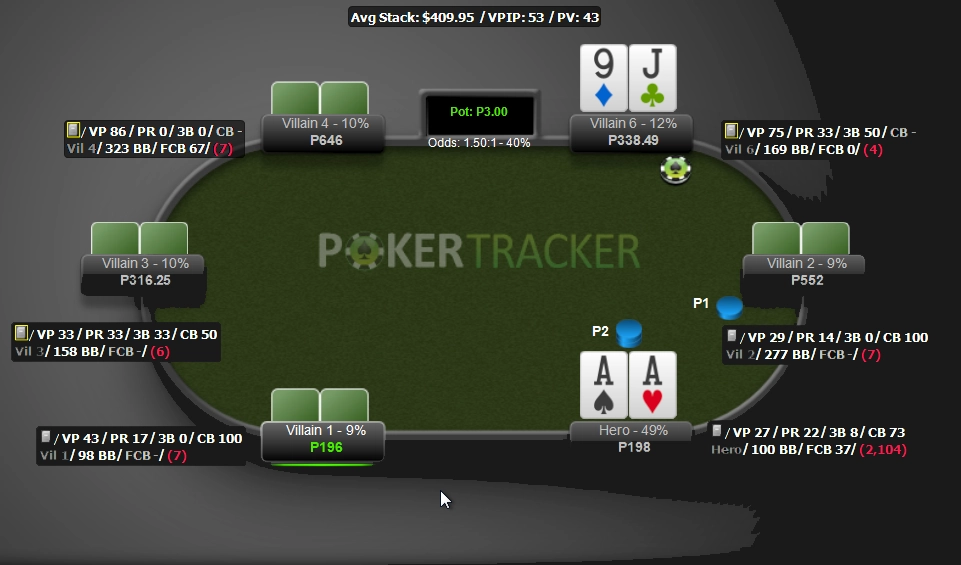
Identifying Player Types
HUD stats give you the ability to categorize opponents faster than a TikTok algorithm works. Below is how it all works:
- Tight-Aggressive (TAG): Low VPIP (12-18%), High PFR (10-15%), High AF (3+). Respect their raises, avoid bluffs, and value-bet relentlessly when you have it.
- Loose-Aggressive (LAG): High VPIP (25%+), High PFR (20%+), High AF. Trap them with strong hands, call down lighter, and exploit their overbluffing.
- Tight-Passive (Nit): Low VPIP (<15%), Low PFR (<10%), Low AF (1-2). Steal their blinds, cbet relentlessly, and fold to their rare raises.
- Loose-Passive (Fish): High VPIP (30%+), Low PFR (<8%), Low AF. Print money by value-betting thinner and avoiding bluffs (they’ll call with anything).
Exploiting Weak Opponents
Weak players leak chips like loose lips sink ships, and you can use HUD stats to poke their holes by doing the following:
- High VPIP + Low PFR: They play too many hands but don’t raise. Punish them by isolating them with strong hands and barreling on scare cards.
- Low Fold to 3-Bet: They can’t let go of marginal hands. 3-bet them less (they’ll call) and value-bet bigger when you connect.
- High Fold to Cbet: They’re literally folding machines. Cbet every flop, then shut down if they call (they most likely have something).
Adjusting to Aggressive Players
The most aggro opponents want you to panic, but you can fight back with data:
- High AF (4+): Let them hang themselves. Check-raise their cbets with strong hands and float flops to steal turns/rivers when they slow down.
- High 3-Bet% (10%+): 4-bet bluff wider (they’re likely overdoing it), but fold to their 4-bets unless you’re nutted.
- Low Fold to 3-Bet: Stop bluff-3-betting. Wait for premiums and stack them.
Improving Positional Play
Position is power, and your HUD acts as a quantifier:
- Late Position Steal%: If a player folds 70%+ from the blinds, attack mercilessly with any two cards.
- Blind Defense Stats: Notice who defends their blinds aggressively (high 3-bet from BB)? Steal less, or 3-bet back with strong hands.
- In Position AF: Players with higher AF in position? Let them bet into you, then check-raise when you’re strong.
Refining Your Own Game
Your poker stats are a mirror—and sometimes, you see a not-so-cute reflection staring back at you. Use your HUD to fix any leaks and make your game more attractive.
- High Fold to Cbet: You’re bluffing TOO much. Tighten your cbet range or double-barrel less.
- Low 3-Bet%: You’re missing a lot of chances to pressure your opponents. Start 3-betting 6-8% of hands.
- VPIP by Position: If your VPIP is 25% UTG, you’re a walking ATM. Tighten up early, widen late.
Advanced HUD Strategies for Serious Players
A HUD in the hands of a serious player? It’s more than a tool—it’s a surgical scalpel. You’re not just reacting to the stats anymore; you’re dissecting them, exploiting micro-trends and engineering edges that are invisible to the naked eye. Want to push your HUD from “helpful” to “unstoppable?” Do the following!
– Streamline your HUD layout: Use only 3-5 core stats (e.g., VPIP, PFR, 3-Bet%) to avoid a visual overload. Your brain can’t process 20 stats across 8 tables!
– Prioritize note-taking: Assign quick color tags (red = maniac, blue = nit) to other players as you see any patterns. This speeds up decisions when they show up at other tables.
– Focus on outliers: At 10+ tables, target players with extreme stats (VPIP >35%, Fold to 3-Bet >75%). These are your profit hubs.
– Use table-selection tools: Pair your HUD with table selection software so that you don’t end up at reg-infested tables and are able to stalk fish across online poker game lobbies.
– Filter for critical moments: Use your HUD to review hands where your stats spiked (e.g., high Fold to Cbet) or tanked (e.g., low W$SD—won $ at showdown).
– Replay hands with opponent stats visible: Study how the players with specific HUD profiles (e.g., 40 VPIP / 5 PFR) exploited you, and then reverse-engineer their tactics.
– Identify population leaks: Identify any trends like “most players fold 65% to river bets” and adjust your default strategy to exploit the pool.
– Lifetime vs. session stats: A player’s lifetime 3-Bet% of 6% means jack if they’re 3-betting 20% this session. Use “last 100 hands” filters to spot tilt or strategy shifts.
– Adjust for stack sizes: Some HUDs let you segment stats by stack depth. A player with a high AF at 50BB might be a legit maniac but tighten up at 100BB.
– Exploit short-term trends: If a tight player suddenly VPIPs 30% over 50 hands, they’re likely tilting or multi-tabling. Punish them, STAT.
– Color thresholds: Set alerts like “VPIP >30% = red background” or “AF <1.5 = yellow text” to flag leaks without reading numbers. - Layer pop-ups by street: Create separate pop-ups for pre-flop (VPIP, PFR, 3-Bet), flop (Cbet, Fold to Cbet), and river (AFq, WTSD%). Right-click for depth when needed. - Custom hero stats: Track your own frequencies (e.g., “Steal% from CO”) in real-time to make sure you’re not becoming predictable. If your 3-Bet% is 2%, even the fish will adjust.
Common Mistakes to Avoid When Using a Poker HUD
Using a HUD might turn you into a poker savant—or it could go the other way and turn you into a data-drunk zombie. The difference between the two states is knowing when you should trust the numbers and when you should trust your instincts. Next up, we go over the most common mistakes players make when using a poker HUD.
Treating HUD Stats as Gospel
- The Trap: Slavishly obeying a player’s 10% Fold to 3-Bet stat while missing their erratic bet-sizing or delayed reactions.
- The Shift: Treat stats as a starting point, not a finish line. Cross-reference data with real-time behavior (sudden speed-ups, chat rants) so that you don’t become a mindless spreadsheet follower.

Overreacting to Small Sample Sizes
- The Error: Declaring someone a “calling station” because they called two river bets in 20 hands. Variance isn’t a personality flaw.
- The Adjustment: Ask for larger samples: 50+ hands for basic stats, 200+ for post-flop tendencies. Until then, assume they’re a wildcard and proceed super cautiously.
Stat Overload
- The Clutter: Your screen looks like a stock ticker—it’s too much! You’re analyzing “Squeeze%” while the timer is ticking down.
- The Trim: Prioritize, prioritize, prioritize! Ask yourself this: “Does this stat change my action?” If not, bury it in a pop-up or just straight-up delete it. Your focus should be on poker, not on data science.
Forgetting You’re Being HUD’d Too
- The Blind Spot: You’ve been c-betting 75% of flops, and now your opponents check-raise you on every dry board. What a shocker (not).
- The Wake-Up Call: Audit your own stats every month. If your fold to 3-Bet is 80%, you’re a target. Rotate your strategies so that you can stay unpredictable.
The Ethics and Legality of Using Poker HUDs
Because poker HUDs have become so popular, of course, they’ve kicked off a debate that’s hotter than a rivered flush (sorry about that pun). Is it fair to use software that analyzes opponents’ habits in real-time, or does it cross over into unsportsmanlike territory? Let’s unpack the ethics, rules, and the unspoken codes that are fueling the controversy surrounding this software!
The Fairness Debate: Tool or Tech Cheat?
The critics argue that poker HUDs tilt the game toward the players who can afford them, and that turns poker into a tech arms race. Casual players logging in for fun rarely know these tools even exist, let alone invest in them. But the grinders with HUDs are exploiting the leaks that are invisible to the naked eye—like knowing that a player folds to 65% of river bets. Defenders have hit back with the argument that poker has always rewarded those who come prepared. Tracking stats manually is tedious and error-prone; HUDs just modernize the process. If the game evolves, why shouldn’t the tools? The core question is this: Is it unfair or just unfamiliar?
Platform Policies: Where HUDs Stand Legally
Most major poker sites tolerate HUDs—but there are limits. PokerStars and GGPoker allow them but ban the features like real-time hand tracking or any AI-driven advice. Others, like Zynga Poker or social gaming apps, prohibit third-party software entirely. But enforcement is another story, as it’s inconsistent. Unless a HUD directly interacts with the client (e.g., auto-folding hands), platforms are struggling to detect it. This creates a gray zone where players will self-police, and rulebreakers usually fly under the radar. Always check a gambling site’s terms of service—ignorance isn’t exactly a great defense if your account gets flagged.
Ethical Play: Balancing Edge with Integrity
Using a HUD ethically hinges on two main principles: transparency and restraint. Experienced players treat HUDs as magnifying glasses, not as hammers. They don’t use the features that violate platform rules (e.g., data mining hand histories from other players) and resist exploiting oblivious recreational players into oblivion. Why? Because killing off the fish too efficiently means there will be fewer games and softer competition in the long run. The best grinders use HUDs to streamline decisions, not to replace their skill. They respect the spirit of competition, and they know that poker is at its best when the ecosystem stays different—and alive.
Choosing the Right Poker HUD Software for Your Needs
Okay, now it’s time to choose a poker HUD if you want to try it out! It’s sort of like picking a poker table—you want one that fits your style, stakes, and your sanity. The wrong tool will be too data-heavy; the right one will feel like it’s an extension of your brain. The following are our picks for the top poker HUD contenders!
PokerTracker 4: The Data Deal
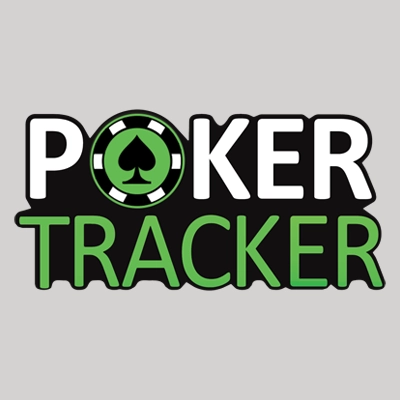
If spreadsheets give you a nice dopamine hit, PokerTracker 4 could be your soulmate. This HUD is the king of poker analytics, and it has everything from custom stat-building to in-depth leak detection. Its advanced filters let you analyze hands by position, stack size, or opponent type, and this makes it perfect for the grinders who like to live in the weeds. But with great power comes a steep learning curve. PT4’s interface isn’t winning any beauty contests, and newbies will probably feel like they’re trying to code for NASA. It’s best for high-volume players, stats nerds, and anyone who thinks “sample size” is a pickup line that will work.
Hold’em Manager 3: The Goldilocks Option

Hold’em Manager 3 is where usability meets depth. It has a clean, drag-and-drop interface that enables you to customize HUDs in minutes and features like “Player Types” auto-label opponents (Tag, Lag, Fish) based on their stats. HM3 excels in cash games, as it comes with dynamic reports that highlight your win rates by stake or time of day. It’s somewhat less customizable than PT4 but far more intuitive—a sweet spot for the players who want insights without a PhD in data mining. This one is best for the mid-stakes grinders, multitablers, and anyone who prefers “plug-and-play” over a ton of tinkering.
DriveHUD: Budget-Friendly Basics

DriveHUD is the Hyundai of HUDs—reliable, affordable, and no frills. At half the price of PT4 or HM3, it has all of the essentials (VPIP, PFR, Cbet) with a concentration on speed over any type of complexity. Its built-in equity calculator and hand replayer are great for beginners who are just getting into data. The downside here is limited customization and a lot of pop-ups. But for $49.99 (vs. PT4’s $99), it’s a steal for micro-stakes players or casuals. This tool is best for noobs, budget-conscious grinders, and players who want “good enough” without having to ante up a lot of money.
Free Trials & Budget Hacks
Most HUDs do have free trials (7-30 days) so that players are able to try them out before they commit to paying. PokerTracker and HM3 cost $99-$150 for lifetime licenses, and DriveHUD sits at $49.99. You can check Black Friday sales or poker forums for discounts—old versions sometimes get price cuts when new ones drop. The best HUD isn’t the most expensive—it’s the one you’ll actually use!
Conclusion: This is Your Poker Brain on HUD
What have we learned about poker HUDs? One, a HUD shows you lots of stats. And two, it helps you to exploit your opponents. But it isn’t only a tool—it’s a complete mindset shift. It forces you to see patterns instead of randomness and trends instead of chaos. All of those VPIP and PFR numbers? They’re not only metrics; they’re a language unto themselves.
Look below for a quick summary of how using a poker HUD can level up your online poker game:
- Instant opponent profiling: Spot nits, maniacs, and calling stations at a glance.
- Leak detection: Uncover if you’re over-bluffing, folding too often, or missing 3-bet opportunities.
- Exploitation made easy: Target players who fold to 70% of cbets or call down with weak hands.
- Efficiency boost: Juggle multiple tables without losing track of who’s who.
So, pick a HUD. Any HUD. Use it until it feels like it is a part of your poker DNA. Then—and this is really important—forget that it’s there. The stats will begin to seep into your subconscious while you concentrate on your timing and outplaying the player who is behind those numbers!
The future of poker isn’t humans vs. bots. It’s humans with bots who use data to play bolder, smarter, and more creatively. Your edge isn’t in the software; it’s in how you wield it, so play ethically and always gamble responsibly!
Looking for more help while playing poker online? Check out our helpful poker cheat sheet that will guide you through the most important aspects of the game.
The Truth About Casino Payout Rates: Are Some Slots Rigged?
You’re at a casino or playing online at a gambling site and feeding money into the beast—your fav slot game. After every spin and dollar after dollar, you have to be thinking, “This HAS to hit soon, right?” But it never does. The machine just eats up your cash, and then you are left to wonder: “Are some slots rigged?”
The short answer to this question? No—and sort of?
Modern slot machines aren’t “rigged” in the shady back-alley, coin-tampering sense—not even close. All licensed and legit casinos use strict algorithms and regulations to guarantee that the games are fair. But not all games—or casinos, for that matter—play by the exact same rules. The real question isn’t whether slots cheat or not. It’s how their payout systems work, who’s policing them, and how you can spot the traps.
In our expose about the truth behind casino payout rates, and if some slots are rigged, we’re gonna look at the following things:
- What “payout rates” really mean (and why they’re not a safety net).
- If casinos mess with machines to make them “hot” or “cold.”
- How to steer well clear of any shady operators and find the games that pay fairly.
By the end, you’ll know exactly why that machine ate your $20—and how to make the smartest and most informed choices when you play!
Understanding Casino Payout Rates
Casino payout rates are comparable to the weather forecast. They tell you what should happen over time, but that doesn’t stop you from getting soaked in a sudden thunderstorm. If you don’t want to get soaked (or worse, go broke), you need to understand three important concepts: RTP, house edge, and volatility. And guess what? None of them care about that gut feeling you have about a certain slot machine.
What Is RTP (Return to Player)?
RTP is the casino’s way of saying, “Here’s your raincheck.” It stands for Return to Player—the percentage of all wagered money a slot machine (or casino game) is programmed to pay back to players over millions of spins.
Here’s an example: A slot with 96% RTP will, theoretically, return $96 for every $100 that is wagered, but this is a long-term average. In the short term, you could win $200 or you could lose $100.
Why RTP Matters
- It’s your best clue for picking games that won’t vaporize your bankroll.
- Slots typically range from 92% to 99% RTP. The higher, the better.
- RTP doesn’t guarantee you’ll ever see that $96. It’s like saying a car gets 40 MPG—on some trips, you’ll beat it, and on others, you’ll just guzzle gas.
How House Edge Works
If the RTP is your raincheck, then the house edge is the casino’s cut. It’s the polar opposite of RTP: the percentage the casino expects to keep over time.
- Formula: House Edge = 100% RTP.
- A 96% RTP slot has a 4% house edge.
Game Variations
- Slots: 1-8% house edge.
- Blackjack: 0.5-2% (with perfect strategy).
- Roulette: 2.7% (European) to 5.26% (American).
Why It’s Unbeatable
The house edge is baked into every single game. It’s why casinos have golden chandeliers, and you have a budget. Over time, the math will always favor the house.
Knowing this, you should play the games that have the lowest house edge to stretch your bankroll. Blackjack > Slots.
Variance & Volatility in Slot Machines
Variance (aka volatility) is the drama queen of casino games, and it decides whether you’ll hop up and down with joy or curse the entire universe after a spin.
Low Volatility Slots
- Payouts: Small, frequent wins.
- Example: Win $5 every 10 spins.
- Best For: Players who hate long droughts.
High Volatility Slots
- Payouts: Rare but jackpot-sized.
- Example: Win $500 once every 500 spins.
- Best For: Thrill-seekers with really deep pockets.
The ‘Hot/Cold’ Slot Myth
- Fact: Slots use RNGs (Random Number Generators). Each spin is independent—like shuffling a deck after every hand.
- Translation: A machine that hasn’t paid in hours isn’t “due.” It’s all totally random.
Why Players Fall for It
Our brains crave patterns. If a slot pays twice in a row, we assume it’s “hot.” If it doesn’t, we call it “cold.” The machine? It is unaware, and it wouldn’t care if it was sentient.
Understanding these three factors won’t make you rich, but it’ll stop you from blaming “rigged” machines when luck’s just not on your side.
Are Some Slots Rigged? Debunking the Myths
Now for the million-dollar question: Are slot machines rigged? The answer isn’t a simple yes or no—it’s a combo of math, regulation, and a sprinkle of paranoia. If you think of casinos like theme parks, then you know that the rides are safe if they’re inspected, but you wouldn’t trust a roller coaster that was built in someone’s backyard. Next up on the agenda is explaining why most slots aren’t rigged…and how you can stay away from the ones that might be!
How Slot Machines Are Programmed
Slots aren’t enigmatic boxes of mystery. They’re just software—complex, yes, but all are bound by rules that are stricter than that one teacher you had in 10th grade. Below is how it all goes down.
The Role of RNG (Random Number Generator)
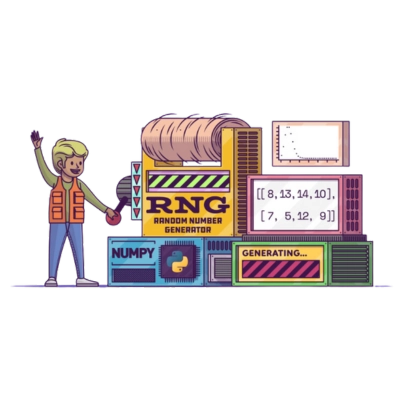
- What It Does: The RNG is the slot’s brain. It spits out thousands of random numbers per second, even when no one’s playing. When you hit “spin,” it grabs the latest number to determine where the reels stop.
- Fairness Guarantee: Legitimate RNGs are tested by third-party auditors (like eCOGRA or iTech Labs) to ensure outcomes are truly random. No patterns. No “cycles.” Just total randomness.
Software Developers & Regulatory Bodies

- Game Developers: Companies like NetEnt, Microgaming, and IGT design the slots games. Their reputations all hinge on fairness—if they rigged games, they’d lose licenses and customers.
- Regulators: Jurisdictions like Malta, the UK, and Nevada require games to meet the strictest standards. The UK Gambling Commission actually fines or revokes licenses for non-compliance with regulations.
Licensed slots are about as “rigged” as your iPhone’s calculator. They follow programmed math, not a casino operator’s whims.
Can Casinos Control Slot Payouts?
Casinos do have some power—but not in the way that you might think.
– The Secret Menu: Slot developers usually create games with multiple RTP versions (e.g., 94%, 96%, 98%), and then the casinos pick the version that they want.
– Example: A casino may choose a 92% RTP slot for higher profits, and a competitor could offer the same game at 96%.
– Myth Busted: Casinos can’t change a slot’s RTP on the fly. Why? Because doing so to change the payout rates requires reinstalling the game software—a process that regulators monitor closely.
– Why It Matters: That “cold” slot isn’t being throttled, it’s just variance doing the thing that it’s supposed to do.
– Near Misses: Slots are programmed to display “close calls” (e.g., two jackpot symbols). This tricks your brain into thinking you almost won—but the outcome was already decided the moment you spun.
– Audit Trails: Licensed casinos are legally required to keep logs of every spin. Tampering would leave evidence, which means they would be risking massive fines.
Licensed vs. Unregulated Casinos
Okay, here is where things can veer into shady territory.
| Licensed Casinos (The Good Guys) | Unregulated Casinos (The Bad Dudes) |
|---|---|
– Regulatory Oversight: They’re audited regularly. For instance, a Malta Gaming Authority (MGA)-licensed casino must submit its RNG and payout reports. | – No Rules, No Mercy: Rogue casinos—which are most often based offshore—can manipulate software. Ever heard of “fake slots” with 50% RTP? They exist. |
How to Protect Yourself
- Play on Licensed Platforms: Check for logos from the UKGC, MGA, or Curacao eGaming (although Curacao does have weaker oversight).
- Research Game Providers: Play slots from reputable developers (e.g., Play’n GO, Pragmatic Play).
- Don’t Be Tempted By “Too Good” Bonuses: Unregulated casinos lure players with insane offers (e.g., “500% deposit match”) to mask the fact that the games are rigged.
Licensed slots aren’t rigged—they’re just math-heavy. But stray into unregulated territory, and all bets are off (literally). Your best defense? Play at reputable casinos, understand RTP and variance, and remember: the house always statistically wins, but it in no way has to cheat to do it.
What Affects Your Chances of Winning?
Winning at slots isn’t just about luck, rituals, or murmuring your undying devotion to the machine in hopes that you’ll win. It’s about understanding the invisible levers that are controlling your odds—levers like RTP, bet size, and bonus terms. Think of it like baking: follow the recipe, and you might get an edible cake. Ignore it? You’ll end up with a burnt mess that ends up in the trash. The following are the important ingredients that you need to have in order to be successful.
Choosing Slots with High RTP
RTP (Return to Player) is your North Star. It tells you how much a slot theoretically pays back over millions of spins. But not all RTPs work the same way!
How to Find RTP Rates
- Game Info Section: Reputable slots display RTP in their rules/paytable (e.g., look for “Game Details” or “Help”).
- Developer Websites: Companies like NetEnt and Play’n GO publish RTPs for their games.
- Casino Forums/Review Sites: Communities Reddit crowdsource RTP data.
Popular High-RTP Slots
- Blood Suckers (NetEnt): 98% RTP. A vampire-themed slot with free spins and low volatility.
- Jackpot 6000 (NetEnt): 98.8% RTP. A retro fruit machine with a “Supermeter” mode for risk-takers.
- Ugga Bugga (Playtech): 99.07% RTP. A tribal slot with a card-game twist.
- Ooh Aah Dracula (Barcrest): 99% RTP. High volatility with a bonus-buy feature.
Stay away from slots with an RTP below 95%. They’re the equivalent of paying $20 for a $10 burrito.
Understanding Paylines & Bet Size
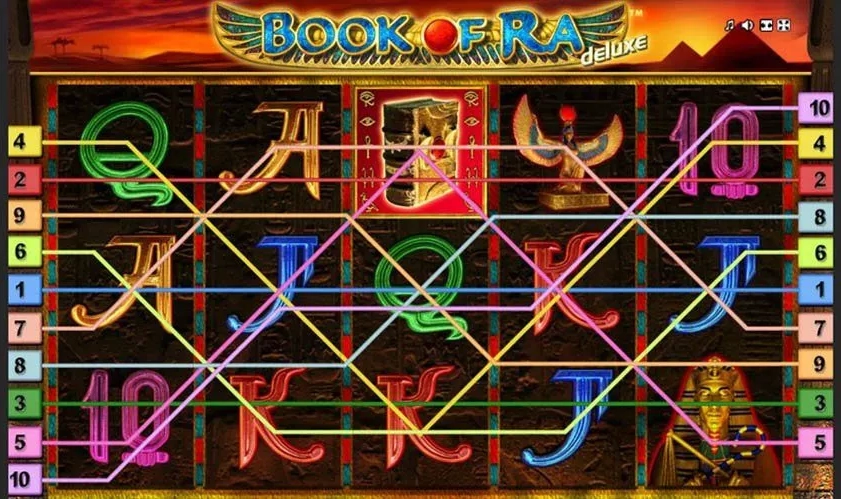
Our next order of business is to demystify paylines!
- Classic Slots: 1-5 paylines (straight lines). It’s simpler, but fewer ways to win.
- Modern Slots: 20-1,024+ paylines (zig-zags, diagonals, clusters). More chances but higher minimum bets.
- Example: A 20-payline slot might require a $0.20 bet to cover all lines ($0.01 per line).
Bet Size Strategies
- Minimum Bets: Stretch your bankroll but reduce win potential. Ideal for low-volatility slots.
- Maximum Bets: Unlock jackpots/progressive features but drain your balance way faster.
The Myth of ‘Max Bet = Better Odds’
- Reality: Betting max doesn’t change the RNG’s outcome. It just lets you qualify for bigger jackpots (e.g., Mega Moolah’s progressive requires max spins).
- Risk: A $5 max bet on a 96% RTP slot still has a 4% house edge. You’ll lose $4 per $100 wagered on average.
What’s the sweet spot in this scenario? Bet 1-2% of your bankroll per spin. If you have a $100 budget, bet $1-$2 per spin.
The Role of Bonuses and Promotions
Bonuses and promos are like Adderall for your bankroll—powerful, but can be really risky if they are misused!
Types of Bonuses That Boost Odds
- Free Spins: Play without risking your cash. Look for no-wagering offers (rare but super valuable).
- Deposit Matches: Turn $50 into $100. Use them on high-RTP slots to maximize value.
- Cashback: Get 10-20% of losses back. Lowers net losses over time.
Critical Terms to Decode
Read over the terms below—you’ll need to know them if you want to make the most of bonuses and promotions!
– Example: 30x bonus + deposit on a 96% RTP slot.
– Calculation: $100 bonus x 30 = $3,000 wagered.
– Expected Loss: $3,000 x 4% house edge = $120. You’d lose $20 net.
– Solution: Target bonuses with WR under 20x.
– Slots: 100% contribution.
– Blackjack/Roulette: 10-20%.
– Trap: Betting on table games with low weighting drags out WR.
– Exceeding the limit (e.g., $5 per spin) voids your bonus.
What to do when you’re playing slots (and what not to do):
– Smart Use: Claim a $100 bonus with 20x WR. Play a 98% RTP slot.
– Total bets: $2,000.
– Expected loss: $2,000 x 2% = $40.
– Net profit: $60 ($100 bonus, $40 loss).
– Dumb Use: Same bonus on a 92% RTP slot.
– Expected loss: $2,000 x 8% = $160.
– Net loss: $60.
Checklist for Better Odds
- Play slots with 96%+ RTP.
- Bet small to survive variance.
- Use bonuses with WR under 30x.
- Avoid max bets unless chasing jackpots.
Slots are designed to entertain, not fund your retirement. Set a budget, track your play, and walk away when it stops being fun.
Tips for Playing Smart & Avoiding Scams
It’s a jungle out there in the online casino world—there are so many! On the one hand, there are tons of trustworthy platforms where you can have fun and possibly walk away with some extra cash. But on the other side, there are some super shady operators who seem to exist solely to take your money and run. The difference between a good experience and a nightmare comes down to knowing how to negotiate this landscape. Next up, we go over how to play smart, evade scams, and keep your gaming experience exactly what it’s meant to be—fun and fair.
Play at Reputable Casinos
Not every casino is worth your time and your money. Some are well-regulated, transparent, and genuinely care about their players. Others? Not so much. The main thing is knowing how to tell the difference.
How to Check for Licensing
Legitimate casinos will proudly display their licensing information and it can usually be found at the bottom of their homepage.
Some of the most respected regulators include the following entities:
- Malta Gaming Authority (MGA): Known for its strict standards and regular audits, the MGA is one of the most trusted names in the industry.
- UK Gambling Commission (UKGC): This regulator is amazing for player protection. Casinos licensed by the UKGC are held to incredibly high standards.
- Gibraltar Regulatory Authority: While not as strict as the MGA or UKGC, Gibraltar is still a reputable regulator.
- Curacao eGaming: This license is easier to obtain and has weaker oversight. Casinos with Curacao licenses can be hit or miss, so tread very carefully.
- Verify the License: Don’t just take the casino’s word for it. Take it one step further and go to the regulator’s website, and search for the casino’s name to confirm that the license is valid.
Avoid Unregulated or Blacklisted Sites
There are several red flags to look out for to see if the site you are playing on is unregulated or blacklisted—below is how you can verify!
- No visible licensing information. If a casino doesn’t clearly state who regulates them, that’s a major warning sign.
- Games from obscure or unknown developers. Reputable casinos partner with well-known providers like NetEnt, Microgaming, and Play’n GO.
- Delayed payments or refusal to process withdrawals. If a casino makes it difficult to get your money, it’s time to walk away.
- Use Trusted Resources: Websites like us (GamblingSite.com) and AskGamblers have updated lists of casinos to avoid, aka online casino blacklists. These are great tools for knowing which platforms are problematic operators.
Try to play in the casinos that are licensed by the MGA or UKGC. These are the regulators who are known for their rigorous standards and commitment to player safety.
Don’t Chase Losses
Some of us have been there: you’re down a bit (or a lot), and you think, “Just one more spin, and I’ll win it back.” But chasing losses rarely, if ever, ends well. It’s a slippery slope that can cause much bigger losses, a ton of frustration, and possibly financial and mental hardship.

How the Cycle Begins
- False Beliefs: Thoughts like “I’m due for a win” or “The next spin will turn things around” will cloud your judgment.
- The Reality: Slot machines use Random Number Generators (RNGs), meaning each spin is completely independent. Past results have absolutely no bearing on future outcomes.
Tips for Responsible Gaming
- Set Limits: Before you even start playing, decide how much you’re willing to lose—and don’t go past that limit. Similarly, set a win limit and walk away when you get to it.
- Use Reality Checks: All reputable casinos have tools like session reminders so that you are able to keep track of exactly how long you’ve been playing.
- Self-Exclusion: If you feel like your gambling is becoming a problem, you can use helpful resources and tools like GAMSTOP (UK) or similar programs to block access to gambling sites.
Chasing losses never ends well and the best strategy of all is to walk away, take a break, and come back later with a clear mind.
Recognizing Fake or Rigged Games
Licensed casinos are all held to the highest standards, but unregulated platforms might have games that are anything but fair. Knowing how to identify these risks can save you time, money, and a lot of frustration.
Warning Signs of Untrustworthy Casinos
- No Demo Mode: Reputable slots usually allow you to play for free. If a game doesn’t have this option? That’s a red flag.
- Unrealistic RTPs: Be super wary of slots claiming to have RTPs above 99%. Legit games almost always range from 92% to 99%.
- Lack of Transparency: Trustworthy casinos provide game histories and payout reports. If this info is missing, proceed with caution.
- Poor Quality: Fake games usually have low-quality graphics, sound, or gameplay. If something feels off, trust your instincts and close that app or tab.
The Importance of Player Reviews
The best info about gambling sites comes straight from the horse’s mouth, so read the reviews from the players who have used the platform!
Here’s What to Look For:
- Complaints about delayed or denied withdrawals.
- Reports of rigged or unfair games.
- Poor customer service experiences.
Where to Look:
- Trustpilot and Reddit are reliable sources for unbiased reviews.
- Avoid relying solely on reviews posted on the casino’s website, as these are usually curated to highlight only the positive feedback.
Play the games that are developed by well-known providers like NetEnt, Microgaming, and Play’n GO. The companies are all known and respected for their fair and transparent practices!
Final Checklist for Safe Play:
– Play on the casinos that are licensed by the MGA or UKGC.
– Set clear loss and win limits before you start playing.
– Test games in demo mode before betting any real money.
– Don’t play at casinos that have vague licensing or negative reviews.
Conclusion: The Reel Deal
Before you scream yourself hoarse with screams of “RIGGED!” when you lose at slots, you need a reality check: the spinning machines aren’t rigged, but they’re certainly not a guaranteed way to hit it rich. They’re made to entertain and, yes, to make casinos money in the end. But that in no way means that you can’t win—but only if you play smart.
Below is a quick recap of what you need to keep in mind when you are playing slot machines:
- RTP (Return to Player): This percentage tells you how much a slot pays back over time. Higher RTP = better odds for you.
- RNG (Random Number Generator): These verify that every spin is random and fair. There are no patterns and no cycles—just pure chance.
- Regulatory Oversight: Licensed casinos are audited by authorities like the MGA and UKGC to guarantee that all games are fair and transparent.
No, slots aren’t rigged, but they’re built with a house edge. That means that in the long run, the casino will always come out ahead. It’s not personal—it’s just math. Your goal shouldn’t be to “beat” the system but to play it smart, so do the following:
- Choose high-RTP games.
- Only play on licensed, reputable casinos.
- Set limits and walk away when you’re ahead (or when you’ve hit your loss limit).
Gambling should always be fun and never a source of anxiety or financial stress. So set a budget, don’t divert from it, and don’t ever chase losses. Yes, the house always has the edge—but that doesn’t mean you can’t enjoy the game!
Have you ever had a sneaking suspicion that a slot game was unfair, or do you have trust in the system? Tell us what you think in the comments—we always want to hear your thoughts and about your gambling experiences!
Surveillance and AI: How Casinos Monitor and Predict Player Behavior
For better or for worse, AI (artificial intelligence) is changing entire industries and rewriting most of the rules in the process. And in the casino sector, it’s becoming more and more prevalent. The sounds of slot machines and the shuffling of cards are being fueled by algorithms. Since its inception, physical casinos have relied solely on loyalty cards, security cameras, and pit bosses to track players’ movements. But in the present? AI is turning those old analog systems into a surveillance operation reminiscent of the book “1984.”
We aren’t being dramatic about the tech, so you can either get comfortable with the idea or become a hermit because it’s not only happening in casinos. But we aren’t here to talk about other industries—we’re here to talk about gambling establishments and how the tech actually works for them.
Like what happens when facial recognition, RFID chips, and machine learning models team up to study your every move? And most importantly, does AI make gambling safer…or just more sneaky? We are rabbit-holing into the shadowy (and super interesting) world of casino AI, from the second that you walk through the doors to the algorithms that can predict when you’ll cash out. The House Edge just got a tech upgrade, but is that a good or a bad thing?
How AI Tracks Players in Casinos
Casinos have always watched their customers—but AI has changed this observation into an art form. The following is how your every move turned into data for the gambling establishment.

Player Tracking Through Surveillance and Facial Recognition
You have just walked into a casino, and before you’ve even hit the bar for a drink, AI has already ID’d you, checked out your gambling history and predicted what your budget is for the time that you’re there. Sounds like something out of the movie Minority Report, yes? Instead of pre-crime detection, it’s for what you’ll do in the joint, and it’s not some future thing—it’s already happening.
Today’s casinos have deployed AI-powered cameras that don’t just record—they analyze. Facial recognition systems like IntelliVision or FaceFirst scan crowds in real-time, and it matches faces to databases of high rollers, banned players, or even those who owe markers (aka casino IOUs). In Macau, some resorts are using AI to track VIPs from the valet to the high-limit room, making sure that the staff can greet them by name and offer them their fav drink. But it’s not all VIP treatment: AI also flags potential card counters, erratic behavior, or excluded problem gamblers who are trying to sneak in.
And these systems learn with every passing interaction. If you always hit the roulette table at 7 p.m., AI notices—and might send a host to coincidentally *wink wink* offer you a bonus right as you’re about to leave.

RFID and Smart Chips in Table Games
Gone are the days of having to take a guesstimate of who’s betting big. Say hello to RFID-enabled chips—the tiny radio-frequency ID tags that are embedded in poker chips. They enable casinos to track every wager as it’s happening. AI monitors the chips to map betting patterns, spot any anomalies, and to catch cheaters.
As an example, let’s say that a player suddenly switches from $10 bets to $500 without any warning. AI has the ability to alert security to watch for card marking or collusion. In 2021, a London casino caught a group using sleight-of-hand tricks with chips, and it was all thanks to RFID data that showed them making impossible bet sequences.
But it’s not just about security. AI uses RFID data to identify “whales” (big spenders) and tailor comps just for them. Lose $10k at baccarat? Don’t be shocked if AI triggers a free suite offer for you before you’ve even gotten up from the table!
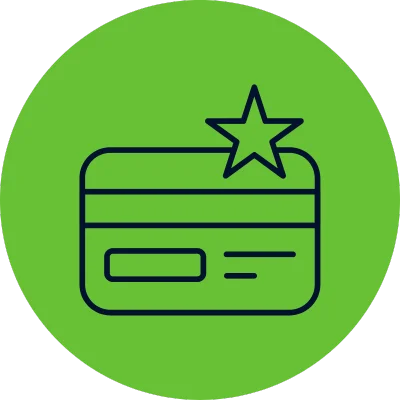
Casino Loyalty Programs and AI Integration
That loyalty card that’s sitting in your wallet? It’s an absolute goldmine for AI data. Every single swipe at a slot machine, every buffet visit, and even your ATM withdrawals all feed into algorithms that profile your habits.
Let’s say you play slots every Friday night, usually around 8 p.m., and you cash out after losing $300. AI links this data to your email, phone, and even social media activity. The result? Hyper-targeted offers. Maybe you get a “Free $50 Slot Credit” text at 7:45 p.m. on Friday—just early enough to lure you in. Or if you’ve skipped a few weeks, AI might send out a desperate Hail Mary: “Your Favorite Machine Misses You! Claim $100 Free Play TODAY.”
MGM Resorts’ MGM 360 program famously uses this approach, as it combines loyalty data with AI in order to boost spending by up to 20% per guest.

AI in Online Casinos & Mobile Apps
As for online gambling sites, these platforms take tracking to Orwellian levels. How? Well, AI doesn’t just watch your bets—it also analyzes how fast you click, which games you hover over, and if you play more after losses, which is a red flag for problem gambling.
Platforms like Stakelogic and Playtech use machine learning to adapt game difficulty in real-time. On a losing streak? The AI might make the next slot spin “win” just enough to keep you playing. Then there are the casino apps that track biometric data via phone cameras—they are monitoring pupil dilation or heart rate to gauge excitement—and then adjust the game in order to maximize it.
In the security department, AI fraud detection tools like SEON scan thousands of transactions per second, and they flag stolen credit cards or possible instances of money laundering. But the critics of AI argue that these systems are dual-use: they protect the casino’s profits first and players second.
How AI Predicts Player Behavior
AI isn’t just watching—it’s also calculating your next move. How so? Below, we get into how casinos are turning your data into ESP machines.

Machine Learning Models for Behavioral Predictions
Casinos aren’t only trying to guess your next move—they’re simulating it. Because it funnels years of player data (win/loss ratios, time-of-day habits, and how many cocktails you order) into machine learning models, AI creates eerily accurate profiles. It’s kind of like your digital doppelgänger that’s built to predict every tap, bet, and cash-out.
How does it work? By doing the following:
- Predicting playtime: If you typically leave after losing $200, AI flags this as your “pain point.” Casinos might send over a host with a free buffet voucher right before you hit that limit.
- Game preferences: Hate slots but love roulette? AI notices and floods your app with “Exclusive Roulette Bonus!” offers.
- Staff optimization: Have you ever had a dealer suddenly become super-friendly? AI tracks which employees keep players at tables longest and rewards them—they have also been known to give the boot to the ones who drive players away.
At Wynn Las Vegas, machine learning models analyze players’ historical data to predict their “lifetime value.” High-value players get personalized treatment: reserved tables, private jet offers, or fancy room upgrades. And the casual players get drip-fed rewards to push them into spending more.
The creepiest part? The models adapt in real-time. If you start playing longer sessions on weekends, AI shifts its predictions—and the casino’s tactics—to match your playing habits.

Dynamic Game Adjustments and Personalized Experiences
We all know that casinos house games of chance—but they’re also games of manipulation. AI adapts gameplay as it’s happening in order to exploit your psychology so that you stay seated and playing. Here’s how it happens with the games and why it works!
- Slot machines: Ever feel like a machine “heats up” after a dry spell? That’s dynamic volatility adjustment. Games like Light & Wonder’s slots use AI to monitor your bets. If you’re about to walk away, the algorithm might trigger a “surprise” bonus round or a near-miss (two jackpot symbols + a loss) to trick your brain into thinking, “I’m close!”
- Table games: AI-powered blackjack tables adjust deck penetration (how many cards are dealt before shuffling) to thwart card counters. If the system detects a player who is tracking cards, it might shuffle after just 10 cards instead of 50—crushing their edge.
- Personalized difficulty: Online platforms like Stake.com use AI to change a game’s difficulty based on skill level. Newbie poker player? The AI will pair you with softer opponents. High roller? It’ll crank up the heat to keep you challenged (and betting bigger).
- The illusion of control: AI also customizes how you lose. Studies show that players tolerate losses better if they feel that they are “in control.” So, games will let you pick bonus symbols or “choose” your odds—even though the AI has already predetermined the outcome.
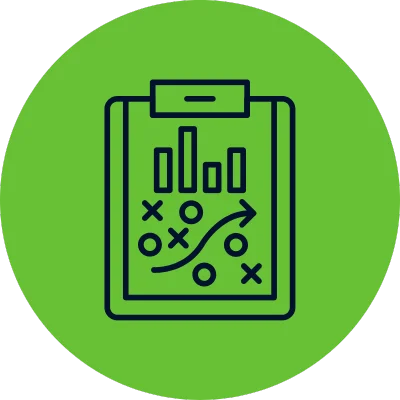
AI-Driven Marketing and Player Retention Strategies
Timing is everything. AI analyzes when you’re most likely to open emails (hint: it’s on Sunday nights) or respond to SMS offers. Forget about generic spam—casino marketing is now a whole new kind of mind game. AI doesn’t only know your name; it also knows your fears, cravings, and weak moments.
Below is how hyper-targeted timing works:
- Emotional states: AI cross-references data brokers to track life events. Recently got divorced? Were you laid off? Casinos buy this data and time their offers to prey on any vulnerabilities.
- Geofencing: Walk near a rival casino? You could get a push notification: “Don’t settle for less! 200% deposit match HERE.”
- Weather manipulation: Caesars’ CodeGreen AI links rainy days to increased gambling. If your local forecast shows storms, you can bank on getting an “Escape the gloom!” offer delivered to your inbox.
- A/B testing addiction: Casinos run thousands of AI-driven experiments to find what’ll hook players. Does a “$50 Free” subject line work better than “Double Your Deposit!”? Does a countdown timer (“Offer expires in 10 minutes!”) pressure you into making impulsive deposits? AI optimizes every pixel of their ads for maximum FOMO (fear of missing out).
- Loyalty traps: Even your “rewards” are engineered. AI tracks which perks you use (free drinks, hotel stays) and dangles them strategically. Skip a month of play? You’ll get a “We miss you!” offer with an expiry date, which creates urgency.
AI and Responsible Gambling: A Double-Edged Sword?
Can algorithms suss out a gambling addiction before the player does? The answer is yes—but only if casinos want them to. AI could be a real lifeline for problem gamblers—or it could be the reason they are drowning in the first place. Next up, we unpack the ethics of AI and responsible gambling.

AI for Problem Gambling Detection
AI’s role in identifying problem gambling is both groundbreaking and controversial. By analyzing thousands of data points—betting patterns (like sudden spikes in wagers), session lengths (marathon 10-hour poker nights), and deposit frequency (reloading a balance 20 times in an hour)—AI can flag any risky behavior with scary accuracy. If a player starts placing $500 bets after months of $20 blackjack hands, AI doesn’t just notice—it calculates the probability of a developing addiction.
Tools like PlayGuard (used by Entain) and BetBlocker cross-reference this data with external factors: Is the player gambling during work hours? Are they in a region that has high unemployment rates? Some systems even track mouse movements in online casinos—rapid, frantic clicks sometimes correlate with desperation.
If and when red flags appear, robotic AIs can intervene in surprisingly human ways, like the ones below:
- Pop-up warnings: “You’ve been playing for 4 hours. Take a break?”
- Deposit limits: Automatically capping daily losses.
- Self-exclusion prompts: Offering links to block access for 24 hours, a month, or indefinitely.
In the UK, regulators require online casinos to use AI for harm prevention. One operator, 888 Casino, reported a 60% reduction in high-risk bets after implementing AI-driven deposit limits. But there is a catch: The tools are sometimes buried in settings menus, and the “PLAY NOW!” buttons are always front and center.

Ethical Concerns: Does AI Keep Players Hooked?
AI knows your weaknesses—and the casino where you play? It’s betting on them.
AI can flag problem gambling, but the critics argue that its primary purpose is to exploit human psychology for profit. The same algorithms that detect addiction are also trained to prevent churn (industry jargon for “quitting”). How? By identifying the exact moment a player is likely to walk away—and dangling a proverbial carrot to keep them playing.
If AI notices you’re about to cash out after a losing streak, it might trigger a “random” slot bonus or offer a 50% match on your next deposit. No, there aren’t acts of generosity—they’re carefully calculated moves that are based on your behavioral profile.
The following are some of the tactics at play:
- Loss aversion exploitation: AI sends “You’re due for a win!” messages to players who’ve lost consistently.
- Personalized traps: If you’re a single parent who gambles after late-night stress, AI will push promotions at 11 p.m. with “Relax and Play!” messaging.
- Dynamic difficulty adjustment: Online slots quietly change odds to create “near-misses” (e.g., two jackpot symbols + a blank) that trick the brain into thinking, “You almost won!”
Even self-exclusion tools have a few loopholes. In 2022, a study found that 40% of self-excluded players returned to the same casino within a year—usually because AI bombarded them with “We miss you!” offers the moment that their ban had expired.
Are casinos using AI to promote responsible gaming—or to weaponize addiction? As long as shareholders demand profit growth, the line between “player protection” and “predatory design” will stay blurry. After all, it’s cheaper to keep a problem gambler than to find a new customer.
AI in gambling is comparable to a fire alarm that also sells matches. It might warn you about the danger—but it’s still fueling the flames.
The Future of AI in Casinos: What’s Next?
The casino of tomorrow isn’t just digital—it’s a shape-shifting beast. Imagine walking into a venue where the walls adjust to your mood, robots read your poker face, and algorithms know your credit score before you do. Buckle up, babies, because the AI gambling revolution is just getting started, and it’s shot out of the gate at record speed!

Fully Automated Casinos: No Humans in Sight
There could very well be a casino with no human staff. No dealers, no cocktail servers, no grumpy pit bosses. Just AI-powered kiosks, facial recognition turnstiles, and drones that deliver drinks to your seat, and it’s already in beta testing.
The following is how it all works:
- Facial recognition payouts: Walk up to a slot machine, and AI scans your face to deduct funds from your linked bank account: no chips, no cards, no cash.
- AI-driven floor layouts: Cameras track crowd flow in real-time, rearranging game placements to maximize traffic (and spending). Too many people clustering at roulette? The floor “morphs” to add more tables.
- Voice-activated gambling: “Alexa, bet $500 on red.”
Companies like MGM Resorts are already testing cashless, staff-less zones in Las Vegas. Meanwhile, SoftSwiss is prototyping AI casinos where even the lighting adjusts to keep players alert—dimming during losing streaks to “soften the blow.”

AI-Powered Dealers and Virtual Gaming Assistants
Robots dealing blackjack? Yup. Avatars that are reading your emotions? Double yup.
We aren’t pulling your leg: Robot dealers are real; just look below!
- Emotion-sensing AI: Dealers like Min, a humanoid robot used in Japan, analyze micro-expressions to detect bluffing. Play a bad hand? Min’s cameras will spot your nervous twitch and raise the stakes.
- ChatGPT on steroids: Just picture a blackjack dealer that trash-talks you in perfect slang, remembers your fav sports team, and jokes about your last bad beat. Some startups are training AI dealers using pro poker player interviews to mimic human banter—only it’ll have none of the human errors.
And there there are the virtual assistants!
- AI concierges: A holographic host greets you by name, recommends games that are based on your bankroll, and will book you a post-win massage. If you’re losing, it’ll “comfort” you with a free drink coupon.
- Mood-based upselling: Feeling lucky after a win? The AI will push you toward high-stakes tables. Stressed? It will suggest “calming” low-risk slots.

Regulations and Privacy Concerns: The Inevitable Backlash
As AI casinos become more common, so do the ethical landmines that surround them.
Here is what the regulatory battlefield looks like:
- GDPR for gambling: The EU is drafting laws that force casinos to disclose exactly how AI uses player data. Want to know why the roulette wheel “randomly” froze your bet? Too bad—these are “trade secrets.”
- Biometric bans: Nevada recently outlawed AI systems that scan palm veins or iris patterns without consent. But in Macau, where surveillance rules, regulators have been oddly quiet.
Privacy problems:
- Data brokers 2.0: Casinos already buy personal data (divorce records, medical bills, etc.) to target vulnerable players. With AI, they’ll predict your next life crisis before you do.
- Algorithmic addiction: Lawsuits are brewing. In 2023, a class-action suit accused DraftKings of using AI to “weaponize” gambling habits. The outcome? A $10M settlement and a lot of unwelcome attention from regulators.
The big question is this: Will governments force casinos to open their AI “black boxes”? Or will lobbyists keep the algorithms shrouded in mystery?
The future of casinos is indeed a contradiction in terms of excitingly high-tech and scarily invasive aspects. AI will create immersive, personalized experiences—while also turning every bet, blink, and breath players take into data points for profit.
Conclusion: Is AI a Game Changer or a Gamble for Players?
AI in casinos is a paradox. On the one hand, it’s a guardian angel that is detecting fraud, curbing addiction, and customizing experiences to your playing preferences. But on the other hand? It’s a puppet master that is using psychological tricks and predatory timing to keep you playing longer, spending more, and chasing losses you can’t afford.
The truth? Casinos aren’t investing billions in AI to protect players. They’re doing it to maximize profits. Sure, responsible gambling tools exist, but a lot of times, they’re simply an afterthought compared to revenue-boosting algorithms.
Look below for a brief recap on how AI is changing the gambling industry via tracking, prediction, and behavioral influence:

Tracking
- Facial recognition IDs players and monitors movements.
- RFID chips detect betting anomalies and cheating.
- Loyalty programs mine spending/gaming data.
- Online platforms log clicks, pauses, and biometrics.

Prediction
- Machine learning forecasts playtime, game choices, and quitting behavior.
- Dynamic odds adjust slot volatility, bonuses, and game rules.
- Algorithms time promotions to retain players.

Behavioral Influence
- Tailored gameplay triggers “near-misses” to prolong engagement.
- Marketing exploits personal data (credit scores, life events).
- Games optimize rewards to maximize dopamine-driven spending.
- Ethical tension: Profit-driven retention vs. responsible gambling.
What’s the verdict? Does AI make gambling safer or more addictive? The answer is both—it’s just about who’s wielding the tech. As of right now, the house doesn’t just have the edge…it now has a supercomputer.
So, the next time that you’re tempted by a “personalized” casino offer, keep this in mind: That “free” $50 might cost you way more in the long run. Stay in the loop, gamble responsibly, and don’t let the AI play you.
How to Spot and Exploit Weak Opponents in Online Poker
Allow us to paint you a picture: it’s 11 p.m., you’re two Red Bulls deep, and you’ve just lost your third buy-in of the night to someone who called your all-in with 7-2 offsuit. Again. You’re staring at the screen, equal parts baffled and furious. “How does this keep happening?”
Welp, here’s the honest truth: online poker isn’t only about the cards that you’re dealt. If you don’t size up the other players? You’re in trouble. Even if you’ve been grinding away studying ranges and pot odds, there’s an entire world of players out there who treat poker just like they would a slot machine—clicking buttons, chasing losses, and basically gifting their money to anyone who knows how to ask for it.
Before you make a rash decision like quitting playing poker altogether, you should know that the players we mentioned above? They aren’t only easy to beat—they’re a necessity to your success in the game! In fact, if you’re not actively hunting for them at the tables, you’re leaving heaps of profit on them. We aren’t going to tell you how to outsmart poker pros—we are going to teach you what the pros do: find the weakest links in the game and exploit them.
Want to know every tell, habit, and leak that basically shouts out, “I’m a weak player?” You’ll learn how to spot them in seconds, isolate them in pots, and drain their stacks with almost surgical precision. By the end, you’ll wonder why you ever wasted time playing “balanced” against opponents who don’t even know what GTO stands for. Want to find out how to turn poker’s biggest fish into your personal ATM? Let’s go fishing!
Why Spotting Weak Opponents Matters
You know that one person who is always bragging about “studying the game for hours” but still loses all of the time? Well, they’re probably playing against the wrong people.
Spotting weak opponents isn’t just a skill—it’s the basics of profitable poker. Look at it like this: you wouldn’t challenge Serena Williams to a tennis match for cash, would you? Yet most players do the equivalent every day by battling tough opponents while ignoring the soft games. Below is why hunting weak players isn’t an optional thing—it’s mandatory if you want to win.
Weak Players (The Fish)
Weak players are the lifeblood of your bankroll. They’re the ones who do the following:
- Call your river bet with third pair “just to see what you have.”
- Chase gutshot draws into a 3-bet pot because “the odds felt right.”
- Bluff $5 into a $100 pot, and then type “I HAD TO TRY” in the chat.

Every time they make a mistake, they’re handing you chips. And the best part (for you, not for them) is that they don’t seem to learn! Unlike the pros, weak players repeat the same errors over and over. They’re the guy who loses $200 chasing straights, reloads, and then does it again an hour later.
The Math Doesn’t Lie
Let’s say you’re heads-up against a weak player on the river. You bet $50 into a $100 pot, and they call with a hand that only wins 20% of the time.
- Their call costs them $30 on average (-$50 x 80% + $50 x 20% = -$30).
- That’s a $30 profit for you—from one bad decision.
If you exploit 10 of these mistakes in an hour? Poker starts to look like a profitable part-time job!
Table Selection
If you have ever thought about why poker pros are grinding at 2 a.m. on a Tuesday, we can tell you that it’s probably not insomnia—it’s table selection. Finding soft games is like striking oil, and here’s how it shakes out:
Playing against pros is like bringing a butter knife to a sword fight. They’ll 3-bet your opens, bluff-catch your rivers, and leave you questioning all of your life choices.
Weak players cluster in the following predictable places:
– Low-stakes tables (they’re here to “have fun,” not study ranges).
– Weekend nights (post-bar poker warriors).
– Tournaments with splashy names (“$10,000 Guaranteed Prize Pool” attracts casual players).
– High average pot size: Indicates loose, aggressive players (i.e., fish splashing around).
– Low VPIP (Voluntarily Put Money in Pot): Avoid these tables—they’re full of tight nits.
– Seat availability: If a table has 2-3 open seats and 5 players, it’s very likely a shark tank.
EV (Expected Value)
Expected Value (EV) isn’t a thing for math geeks. It’s the difference between the important factors below:
- Playing against weak opponents: Printing money.
- Playing against strong opponents: Donating money.
| Scenario | Hourly Win Rate |
|---|---|
Table with 3 weak players | $25/hour |
Table with 3 pros | -$15/hour |
That’s a $40/hour swing, and it’s based purely on who you’re playing. Even world-class players have slim edges against other pros (like 1-2% ROI). But against weak players? Their edge rockets up to 10-20%. It’s the difference between scraping by and living large.
Common Characteristics of Weak Online Poker Players
Weak poker players are like toddlers with AMEX cards—they don’t know what they’re doing, but they’ll keep on swiping until someone stops them. And that’s amazing for you because their leaks are glaringly obvious if you know where to look. Below, we examine the seven deadly sins of bad poker players and why they’re your golden goose.
| Characteristic | What It Looks Like | Why It’s Weak | How to Exploit Them |
|---|---|---|---|
Frequent Limping | These are the players that enter pots by just calling the big blind instead of raising. It’s like ordering tofu at a steakhouse—like, why are you even here? | Limping yells, “I have NO idea what I’m doing!” They’re passive, scared to commit chips, and usually are holding marginal hands (like K-7 suited or pocket fours). | Isolate them with raises. If they limp, bump it up 3-4x the big blind. They’ll either fold (free money) or call with a weak range. C-bet relentlessly post-flop. Most limpers will check-fold if they miss the board. |
Calling Too Much | These players treat folding like it is a moral failure. You’ll see them call down three streets with a second pair or a gutshot draw that’s mathematically doomed. | Calling stations don’t understand equity. They’ll pay $50 to chase a $10 draw, thinking, “But I felt a diamond coming!” | Value bet like you’re a sociopath. Bet big with top pair, overpairs, or even middle pair—they’ll call with worse. Never bluff. Seriously. They’ll hero-call with ace-high just to “keep you honest.” |
Over-Betting or Under-Betting | Weak players have absolutely no concept of sizing. They’ll bet $2 into a $20 pot with the nuts, then shove $100 with air on the next hand. | Their bets are all emotional, not strategic. Small bets = weak hands, big bets = strong hands. It’s kinda like they’re sending you their hole cards via Morse code. | Snap-call their tiny bets. They’re likely bluffing or plain scared. Fold to their overbets unless you have a monster. They’re not “polarizing their range”—they’re just scared you’ll call. |
Playing Too Many Hands (Loose-Passive Playstyle) | These players are in every. Single. Pot. You’ll see them showdown 8-3 offsuit like it’s a badge of honor. | They treat poker like a lottery ticket—the more hands they play, the more “chances to win.” But they’re losing money on every ticket. | Tighten up and punish. Wait for premium hands (A-K, big pairs), then extract the maximum value. 3-bet their wide opens. They’ll fold most of their junk or pay you off when you’re ahead. |
Lack of Aggression | These players check-call their way to the river, hoping to back into a win. If they ever raise, they’ve got an insanely good hand. | Passive players are allergic to pressure. They’d rather lose slowly than risk being wrong. | Bluff more often. If they never raise, you can steal pots with well-timed aggression. Float the flop. Call their weak bets, then take the pot away on later streets. |
Playing Predictably | If they bet big, they’ve got it. If they check, they’re weak. You could write their strategy on a Post-It note. | Predictable players are one-trick ponies. They don’t balance their ranges, so you always know exactly where you stand. | Adjust your bluff frequency. If they only bet big with strong hands, bluff more when they check. Trap them with slow plays. Let them bet into your monsters. |
Using the Chat Box Too Much | “RIGGED!!!” “How did you call that?!” “I never win a flip!” These are the players who type more than they fold. | Chatty players are emotionally invested. They’re on tilt, distracted, or just here to vent—not to win. | Trigger them further. A well-timed “Nice call…” after they make a bad play can send them into a full-blown meltdown. Target their stack. Tilted players spew chips. Isolate them in pots and let them self-destruct. |
How to Identify Weak Players Quickly
You don’t need Superman’s X-ray vision to see who is a weak poker player—just a knack for noticing the glaring patterns they leave in their wake. Think of it like witnessing someone trying to hide a neon sign under a blanket: their habits are super obvious, predictable, and oh-so-profitable. Below is how to sniff them out!
Pre-Flop Habits
Weak players all but announce their intentions before the flop—they just don’t know it. The following is what to watch out for:
- The Chronic Limper: They limp into 50% of pots like they’re paying entry fees to a museum. “Let me just peek at the flop…”
- Exploit them: Raise their limps 3-4x to isolate. They’ll either fold (free blinds) or play a weak range out of position.
- The Call-and-Fold Artist: They’ll flat your raises with hands like J-7 suited but never 3-bet. It’s like they’re allergic to aggression.
- Exploit them: Steal their blinds relentlessly. They’ll fold to 70% of pre-flop raises.
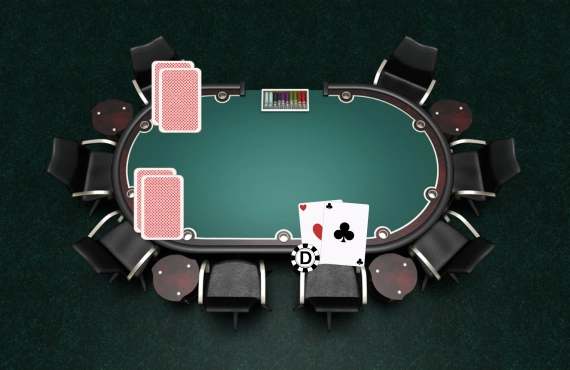
Post-Flop Play
Post-flop is where the weak players crumble like a biscotti in coffee. These are the main red flags:
- The Ghost C-Bettor: They raise pre-flop, then check-fold on a missed flop. Translation: “I have nothing, please take the pot.”
- Exploit them: Bluff them off hands by betting 50-60% pot on the flop, and they’ll vamoose.
- The Draw Chaser: They call your turn bet with a gutshot (20% equity) like they’re owed a favor by the poker gods.
- Exploit them: Charge them maximum for draws. Bet big on the turn to punish their naive hope.
- The Sizing Psychic: They min-bet the river as a “blocker” or overbet 200% pot with the nuts. There’s no in-between.
- Exploit them: Snap-call their tiny bets (they’re bluffing) and fold to their massive overbets (they’ve got it).
Showdown Clues
Showdowns are weak players’ confession booths, so listen up!
- The Open-Book Reveal: They show down 9-4 offsuit after calling three streets. “I thought a 4 might come!”
- Exploit them: Tag them as a chronic chaser and value bet thinner hands, knowing that they’ll call.
- The Bluff Baby: If they bet big on the river, they’ve got it. If they check, they’re folding—zero balance.
- Exploit them: Fold against their aggression unless you have a monster. Bluff them mercilessly when they check.
- The Tilt Volcano: After losing a pot, they type “I’m done,” reload, and shove 72 offsuit.
- Exploit them: Target them immediately—they’ll overplay their weak hands and underfold.
Strategies to Exploit Weak Opponents
Weak poker players are kinda like malfunctioning vending machines—they’re predictable, they spit out freebies, and if you know how to shake them just so, they’ll empty their pockets. How can you turn their flaws into your fortune? By doing the following!
Against Loose-Passive Players (“Calling Stations”)
These players all treat folding like it’s a deadly sin. They’ll call you down with third pair, ace-high, or even a dream. What’s your mission with these marks? To extract value, not any drama.
– If you have top pair or better, size up! They’ll call with worse (e.g., bet 75% pot on the river with two pair—they’ll pay you off with second pair).
– Example: You hold A♠K♣ on a K♥8♦3♠ board. Bet 80% pot on all three streets—they’ll cling to their K♥7♦ like it’s a life jacket.
– Bluffing a calling station is like trying to drown a fish, and they’ll hero-call with bottom pair, so stick to value hands.
– Let them catch up. Check the flop with a set, then bomb the turn and river—they’ll talk themselves into paying you off.
Against Tight-Passive Players (“Nits”)
These players guard their chips like it’s their full-time job, and they’ll fold unless they’ve got the nuts. What time is it? It’s time to bully them (but don’t be mean about it).
– Raise their big blind with any two cards. They’ll fold 80% of hands pre-flop.
– Example: You’re on the button with 7♥2♦. Raise 3x—they fold A♥5♠ in the big blind.
– If they check the flop, bet 50% pot. They’ll fold unless they’ve hit a piece.
– Example: Board is Q♣8♠3♥. They check—bet with 9♦6♦. They’ll muck A♠2♠.
Bet big when they show any sign of weakness, and they’ll fold their hands like A-J on a Q-high board.
Against Loose-Aggressive Players (“Maniacs”)
This kind of player thinks that aggression is a personality trait. They’ll bet, raise, and bluff like their rent’s due tomorrow, and they don’t have it, so all you have to do is let them self-destruct.
– Call down with marginal hands (e.g., top pair). They’ll barrel off with air.
– Example: You have K♦Q♠ on a K♥7♣2♦ board. Check-call their bets—they’re holding 5♥4♥.
– Don’t play 8♥7♥ against a maniac. They’ll out bluff you, so stay with strong holdings.
– Check your flopped flush, let them bet three streets, and then spring the trap on the river.
Against Players on Tilt
Tilted players are emotional powder kegs. They will chase losses, overbet, and curse their ancestors and the poker gods, and you can exploit their meltdown!
– Watch for chat rants (“RIGGED!!”) or sudden all-ins after a bad beat.
– 3-bet their opens light. They’ll call with junk or shove recklessly.
– Example: They raise UTG—you 3-bet with J♣9♣. They snap-shove 7♦3♦.
Check-raise their tilt-induced bluffs. They’ll stack off with ace-high.
Using Poker HUDs and Stats to Spot Weakness
How can you use poker HUDs and stats to spot player weaknesses? We have some handy cheat codes—all you have to do is tweak your strategy and watch as their leaks become your leverage!
- VPIP >35% = Loose Player – These players enter too many pots with weak hands (e.g., J♦3♣, 8♥5♠). Exploit them by 3-betting wider (target their limps or opens) and value betting aggressively (they’ll call with second pair or worse).
- PFR <15% = Passive Pre-Flop – They limp or call instead of raising, signaling a weak range. Punish them by stealing their blinds with any two cards and isolating their limps (raise 4x to force folds or trap them with weak holdings).
- AF <1.5 = Low Aggression – They check/call far more than they bet/raise. Bluff relentlessly (bet 60% pot on missed flops) and float their weak bets (call flop, steal turn) to dominate post-flop.
- WTSD >30% = Calling Station – They over-call to showdown with marginal hands (e.g., 4th pair, ace-high). Bet for maximum value (even mid-strength hands win) and avoid bluffing—they’ll hero-call with garbage.
Table Selection: Finding the Softest Games
Choosing the right poker table is like picking a ripe avocado—muck it up, and you’re stuck with a pricey, inedible fruit. But if you get it right, hey, you’ve got the main ingredient for guacamole! Or avocado toast; it’s up to you. Anyway, here’s how to find the softest poker games online:
| Characteristic | Why It Works | What To Do |
|---|---|---|
Hunt for High Average Pot Sizes | Loose players love to splash around. Big pots mean they’re calling too much, bluffing recklessly, or overvaluing weak hands. | – Scan the lobby for “Avg Pot” stats 2-3x the big blind. |
Dodge Low VPIP Tables | Tables with VPIP <25% are packed with tight players who only play premium hands. You’ll bleed chips battling their disciplined ranges. | Use your HUD to check the average VPIP before sitting. If the table VPIP is green (low) in your poker client, bounce up out of there! |
Recon the Table Chat | Recreational players treat chat like it’s a therapy session. They’ll rant about bad beats (“I had AA vs 72o!!!”), blame luck, or even apologize for winning. | Lurk at tables with active chat. Phrases like “gg” or “unlucky” = soft players. Steer clear of those silent tables—pros are concentrating on playing, not typing. |
Abuse Lobby Filters | Gambling sites with poker will let you filter for player profitability, hands per hour, etc., and Fish leave digital breadcrumbs. | Filter for “High Hand %” (indicates loose players). Don’t use the “High Winners” tabs—those are literal shark tanks. Use “Seat Preferences” to find tables with 2-3 open seats (fish swim in schools). |
Mindset: Staying Sharp and Don’t Get Cocky
Poker humility is like a seatbelt—it won’t make you invincible, but it will keep you from flying through the windshield when variance hits. The following is how to stay grounded while exploiting weak players (even when they “luckbox” their way to a win):
Weak Players Get Lucky, Too (And That’s Okay)

- The Trap: You’ve played perfectly, but they spike a two-outer on the river and type “EZ GAME” in chat. Cue the tilt tsunami.
- The Fix: Bad beats are taxes on long-term profits. If they’re chasing 5% draws, let them. You’ll win 19 times out of 20.
- Track your EV: Use tools like PokerTracker to see if you made +EV decisions, not just whether you won the pot.
- Mute the chat: Don’t let their emoji spam or “LOL” get into your head and rattle you.
Discipline Over Desperation

- The Trap: After a losing session, you start bluffing, calling stations, or folding to nits “because nothing’s working.”
- The Fix: Stick to the script! If your strategy works 60% of the time, don’t abandon it just because of a 40% bump in the road. Set stop-loss limits and quit after losing 3 buy-ins. Why? Because tilt is a silent bankroll killer.
- Review hands cold: Analyze decisions without results bias. Ask yourself: “Would I do this again?”
Keep Sharpening Your Edge
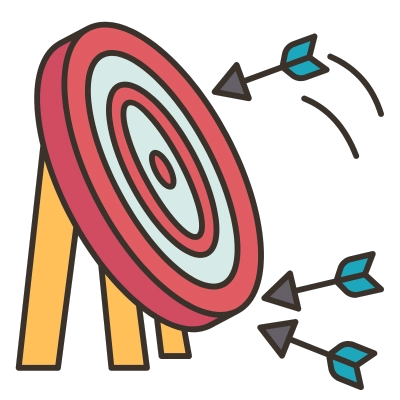
- The Trap: You have been absolutely crushing weak players for months… until they adapt (or worse, you get lazy).
- The Fix: Study their evolution! Fish eventually learn to fold pre. Update your HUD stats and adjust.
- Learn new exploits: Rabbit hole forums, courses, or hand history reviews—the best players are eternal students.
- Mix up your game: If you’ve only mastered NLHE, try PLO. Soft games are everywhere.
Conclusion: Fold’em, Hold’em, Exploit’em
Here’s the unvarnished truth: online poker isn’t a test of skill alone—it’s also a test of patience and precision. Weak players are the bankroll of your profits, and exploiting them isn’t optional—it’s an important part of the game if you want to win!
To recap our main points:
- Profit thrives on leaks: Limpers, over-callers, and emotional players will fund your wins.
- Adaptation beats perfection: No GTO mastery is required—just punish predictable mistakes.
- Table selection is king: Avoid the pros, sniff out those fish, and guard your edge like it’s the Crown Jewels.
What’s on your checklist? Spot the limpers, punish the callers, and ignore any tantrums in the chat. Stay disciplined when variance bites, and never let a bad beat mess up your strategy. Weak players will come and go, but a good mindset? That has staying power. You know what else has staying power? Gambling responsibly, so even if you are at the softest tables, don’t get carried away.
If you want a little bit of help before or even while your playing, check out our Poker Cheat Sheet. There you can get the most important information you need to be successful and even find a free printable PDF for it.
So, what’s next? Stop reading this and start playing! Find a table, spot the leaks, and stack those chips. The easy money is hiding in plain sight right across the table from you.
Can Gambling Make You Smarter? The Cognitive Skills You Build at the Tables
What if every card you play and every bet you make is actually a good workout for your noggin? Is your brain doing reps when you gamble?
Gambling sometimes, okay, a lot of the times, gets a bad rap. But when you strip away the negative stereotypes, you’ll find that the games like poker and blackjack aren’t only driven by chance. They’re mental gyms where strategy, math, and emotional grit collide.
Skill-based gambling isn’t only about winning cash—although that’s definitely a bonus. When you play, you are building sharper decision-making, math fluency, and emotional resilience. And these are all valuable skills that pay off even when you’re not at the casino!
Myth-Busting: Gambling Is Just About Luck
Before we begin, we need to address the elephant in the room: the idea that gambling only involves luck. Sure, a lot of games rely purely on chance, but others? They are literal playgrounds for a strategic mind!
Common Misconception
Slots and roulette do tend to dominate the gambling stereotype—nothing but randomness. But lumping all gambling into that singular category is like saying that all sports are “just running around.”
Shift Perspective
Skill-based games like poker and blackjack are battles of strategy, not just luck. You’re crunching odds, reading your opponents, and making split-second decisions. Yes, luck is dealing the cards, but your skills are playing the hand that you are dealt.
The Cognitive Skills You Build at the Tables
The difference between an experienced player and a casual player pretty much comes down to a mental fortitude that was forged under pressure. Yes, it can be learned, but it doesn’t just happen.
Strategic Decision-Making
How exactly does strategic thinking unfold during a game? Like this:

- How It Works: Poker forces you to weigh risks in real-time. Do you fold a weak hand, call a bluff, or double down? Every move is a lesson in cost-benefit analysis.
- Real-Life Benefits: From negotiating job offers to managing a tight budget, life tends to reward those who can think two or three steps ahead.
Math Skills and Probability
Now, let’s break down how math drives every decision that you make at the table:

- How It Works: Blackjack isn’t luck—it’s basic arithmetic. Card counters track ratios, calculate house edges, and know when to walk away. It’s math in motion.
- Real-Life Benefits: Budgeting, investing, or even planning a road trip—numbers stop being abstract concepts and start working for you.
Emotional Regulation and Patience
And if you have the strategies and math skills down, how do you manage to maintain your composure under the pressure? By doing the following:

- How It Works: Losing a big hand and tilting (emotional frustration) will ruin your game. Pros have learned (and mastered) the instant reset—there is no anger and no sulking.
- Real-Life Benefits: If you can keep your head about you and stay calm during conflicts, handle any stress at work, or make it through holiday gatherings with relatives, it’s worth it.
Pattern Recognition
Okay, on to pattern recognition! How do players decode any hidden clues during games? By working on the following things:

- How It Works: Spotting a player’s “tell” or predicting dealer habits isn’t sorcery—it’s simply noticing micro-patterns that others could miss.
- Real-Life Benefits: Detecting red flags in contracts, anticipating market shifts, or decoding your romantic partner’s cryptic texts.
Examples of Successful Players
If you’re still a skeptic, allow us to give you more concrete evidence—below are some examples of real (and successful) players who turned their gambling into a showcase of cognitive prowess.
Profiles of Poker Pros
- Daniel Negreanu: A master of psychological warfare, Negreanu’s ability to read opponents earned him six World Series of Poker bracelets and over $42 million. His mantra? “Adapt or die.”
- Vanessa Selbst: The Yale Law grad turned poker phenom used analytical rigor to dominate male-dominated tables, racking up $11.8 million in earnings.
- Chris Moneymaker: The accountant who turned an $86 online qualifier into a $2.5 million WSOP win, proving that skill can trump pedigree.
- Maria Konnikova: A psychologist and author who used poker to study decision-making—and accidentally became a pro, winning over $300k.
Cross-Skills Success
- Bill Chen: A poker pro with a Ph.D. in math who applies game theory to Wall Street trading.
- Annie Duke: A former poker champion who now coaches CEOs on decision-making under uncertainty.
Are These Skills Accessible to Everyone?
You don’t need to be a math genius or a poker savant! Every single one of these skills is learnable—but only if you’re willing to practice and put in the work!
Learning Curve
It’s kind of like trying to learn a new language—gambling’s mental skills start out clunky, but eventually, they become instinctual. Start small, study a lot, and let your losses teach you lessons.
Tools for Growth
The following is a curated list of our favorite tools and resources that can elevate your game—all are backed by expert recommendations and proven results!
- GTO Wizard: Solves complex poker scenarios using Game Theory Optimal (GTO) strategies. Offers AI-powered analysis for preflop/postflop decisions, equity calculations, and interactive training modules.
- Ideal for: Players who want to master balanced strategies and exploit their opponents’ leaks.
- PioSolver: A GTO-based solver that analyzes hand ranges, simulates outcomes, and optimizes decision trees. The free version is super beginner-friendly, and the Pro versions handle advanced multi-way spots.
- Ideal for: Serious players who want to dissect deep-stack tournaments or cash games.
- Flopzilla: Visualizes hand ranges and equity distributions across flops. Simplifies range-vs-range analysis to identify profitable lines.
- Ideal for: Developing range-based thinking and postflop strategy.
- HoldemResources Calculator (HRC): Integrates ICM (Independent Chip Model) calculations for tournament play, including PKO (Progressive Knockout) and multi-table dynamics.
- Ideal for: MTT grinders optimizing late-stage tournament decisions.
- Run It Once: Founded by Phil Galfond, this platform has video libraries, interactive GTO trainers, and forums. It covers cash games, tournaments, and live poker nuances.
- Best feature: The “GTO Trainer” lets you practice optimal strategies against AI opponents.
- Upswing Poker: Co-created by Doug Polk, it provides courses like the “Poker Lab” for cash games and tournaments. Includes hand breakdowns, HUD setups, and bankroll management guides.
- The best feature is Community Discord, which provides real-time feedback.
- Pokercode: Founded by Fedor Holz, this elite platform focuses on mental game coaching, advanced PLO strategies, and community-driven learning.
- Best feature: Access to Holz’s personal hand histories and live session analyses.
- Raise Your Edge: Bencb’s tournament-focused masterclasses, including free beginner courses and advanced knockout (KO) tournament strategies.
- Best feature: Pre-flop range charts tailored for modern MTT metas.
- “The Theory of Poker” by David Sklansky: Core concepts like implied odds, pot equity, and bluffing frequencies. A must-read for foundational poker theory.
- “Beat the Dealer” by Edward O. Thorp: The classic blackjack card-counting system (Hi-Lo method) and probability-based betting strategies.
- “The Mental Game of Poker” by Jared Tendler: Overcoming tilt, building emotional resilience, and maintaining focus during long sessions.
- Equilab: A free equity calculator for comparing hand ranges and simulating postflop scenarios. Includes an “Equity Trainer” for practice quizzes.
- PokerStars School: Free tutorials, hand quizzes, and bankroll management guides. Perfect for beginners transitioning to micro-stakes.
- ICM Trainer: Teaches tournament-specific ICM decisions through interactive exercises. The light version is free, and the full version includes more advanced simulations.
- PokerSnowie: Uses AI to analyze your playstyle and suggest GTO adjustments. Simulates millions of hands to identify leaks.
- Ideal for: Players refining preflop ranges and bet-sizing.
- Advanced Poker Training (APT): AI-powered bots mimic real-player tendencies (e.g., loose-aggressive, tight-passive), and have post-session feedback and leak reports.
Why These Tools Work
The above resources combine theory, practice, and community support. GTO Wizard’s AI-driven solutions and Run It Once’s pro-led content are a conduit between learning and application. Books like “The Theory of Poker” give players timeless frameworks, and AI tools like PokerSnowie adapt to modern metas.
- Our Pro Tip: Combine software analysis (e.g., PioSolver) with community feedback (e.g., Upswing’s Discord) to accelerate your growth and cross-reference strategies with real-world hand histories!
The Ethical Side of Gambling
Before you even commit to the game, you have to know and understand the risks. Gambling’s perks do come with some hazardous territory, and ignoring them is always a losing bet.
Addressing Concerns
Gambling isn’t just a game—it’s an entire ecosystem that has a lot of real-world consequences. Yes, skill-based play can sharpen your mind, but the industry’s ethical complexities do call for scrutiny. From addiction risks to the societal impacts, here’s what you need to know so that you can engage responsibly.
The Addiction Risk
Gambling addiction (officially termed gambling disorder) affects ~1-3% of adults globally. It rewires the brain’s reward system, prioritizing short-term dopamine hits over long-term consequences. Unlike substance abuse, it’s a “hidden” addiction with no physical symptoms, and that makes it harder to detect.
Red flags to watch out for:
- Chasing losses (“I’ll win it back next hand”).
- Lying about the time/money you have spent gambling.
- Borrowing money to fund your bets.
- Neglecting your work, relationships, or hobbies.
The Gambling Industry’s Role
Critics argue that casinos and gambling sites use psychological tricks to exploit vulnerability, like the following tactics:
- “Near misses” (e.g., slot machines showing two cherries and a blank).
- Losses that are disguised as wins (e.g., winning back $10 after betting $50).
- Auto-play features that encourage mindless, repetitive betting.
Cognitive Biases & Exploitation
The following are some of the most common distortions that fuel risky playing behavior:
- Gambler’s Fallacy: Believing past outcomes influence future results (e.g., “Red has hit five times—black has to be next!”).
- Illusion of Control: Overestimating skill in luck-based games (e.g., thinking you can “time” a slot machine).
- Sunk Cost Fallacy: Continuing to bet to justify prior losses (“I’ve already spent $500—I can’t quit now”).
And these are the ethical gray areas:
- Predatory Advertising: Targeted ads for free bets or “risk-free” offers, which are usually aimed at young or more vulnerable demographics.
- VIP Programs: Casinos incentivize high rollers with perks (private jets, luxury suites) to keep them gambling beyond their means.
Financial & Psychological Toll
The numbers concerning the financial and psychological toll that gambling can take don’t lie:
- The average problem gambler accumulates $40,000-$70,000 in debt.
- 20% of bankruptcies in the U.S. involve gambling-related debt.
- Mental Health: Problem gamblers are 3x more likely to experience depression and 5x more likely to attempt suicide.
- Relationships: Secrecy and debt erode trust and can result in divorce or family estrangement.
Societal Impacts
As for the societal impacts, who pays the price?
- Taxpayer Burden: Public funds usually cover treatment programs, debt counseling, and legal costs tied to gambling-related crime (e.g., embezzlement).
- Youth Exposure: 60% of teens have gambled by the age of 18–loot boxes in video games have normalized risk-reward behavior.
- Communities: Casinos do certainly give a boost to local economies but they may also increase crime rates and bankruptcies in the surrounding areas.
Responsible Gambling Tools
Here is how you can protect yourself (and others):
Self-Exclusion Programs
- GamStop (UK): Blocks access to all licensed gambling sites for 6 months to 5 years.
- National Council on Problem Gambling (U.S.): Offers state-specific exclusion tools.
- Deposit Limits: Set daily/weekly caps via apps like BetBlocker or casino account settings.
- Reality Checks: Apps like Gamban send alerts when you’ve played for a set time (e.g., 30 minutes).

Third-Party Tools
- Pause feature on Apple Pay/Google Pay: Restrict gambling transactions.
- Responsible Gambling Council: A centralized database of resources for anyone who is struggling with gambling.
Ethical Operator Practices
As for online gambling sites and land-based casino operators? Ethical platforms should practice the following:
- Promote responsible gambling tools proactively (not buried in fine print).
- Ban credit card deposits (as seen in the UK and Spain).
- Fund addiction research and helplines (e.g., 1-800-GAMBLER).
What to look for (and call out if it’s missing):
- Transparency: Clear display of odds, house edges, and RTP (Return to Player) rates. Example: A slot machine with a 95% RTP means the house keeps 5% long-term.
- Fair Marketing: No targeting of minors, students, or low-income groups.
- Anti-Predatory Design: No autoplay or “speed roulette” features. Mandatory cooling-off periods after large losses.
- Certifications: Look for seals like eCOGRA (fair gaming) or GamCare (responsible gambling standards).
Personal Accountability
Ask yourself the following questions:
- Am I gambling for fun or escape? If it’s the latter, pause and seek support.
- Do I track my wins/losses? Use apps like Poker Income Tracker or spreadsheets to audit habits.
- Could I walk away today? If the thought of quitting triggers anxiety, it’s a pretty big red flag.
Finding Balance
Treat gambling like a sport, not a side hustle. Set strict budgets, walk away after losses, and never bet what you can’t afford to lose.
Yes, skill-based games can result in growth, but the industry’s profit-driven tactics often prey on human weakness. What is the solution to finding a modicum of balance? Demand accountability—from operators, regulators, and, most importantly, from yourself.
If You Need Help:
- U.S.: Call 1-800-GAMBLER or visit the National Council on Problem Gambling
- UK: Contact GamCare
- Global: Find resources via Gamblers Anonymous
How to Get Started Smartly
If you’re intrigued by the idea of turning the casino into your very own cognitive training ground, we have a blueprint for you! This isn’t about going all in on your first run—you have to build skills methodically, take the least amount of risks, and stay in control. Below, we walk you through it step by step!
Step-by-Step Guide
Why it matters: Not all games are the same—not by a long shot. Concentrate on the ones where your decisions directly influence outcomes.
- Poker (Texas Hold’em): The ultimate brain game. You’re battling opponents, not just odds. Start with No-Limit Hold’em—it’s the most widely played and strategy-rich variant.
- Blackjack: A numbers game where basic strategy can reduce the house edge to under 1%. Perfect for math-minded players.
- Sports Betting (for stats nerds): If you love analytics, this combines probability modeling with real-world data. Stick to sports you really understand.
Avoid: Slot machines, roulette, and lottery-style games—all of them are pure luck and offer zero skill development.
Would you run a 10k marathon without training? We hope not! In the same vein, don’t gamble without studying.
Phase 1: Master the Basics
- Poker: Learn hand rankings, betting rounds (pre-flop, flop, turn, river), and positional play. (Check out our Poker Cheat Sheet for reference)
- Blackjack: Memorize the basic strategy chart (when to hit, stand, split, or double down).
Resources:
- Books: Harrington on Hold’em (poker), Beat the Dealer by Edward Thorp (blackjack).
- YouTube Channels: “BlackRain79Poker” for low-stakes strategy, “CasinoTop10” for blackjack tutorials.
- Apps: “PokerCoaching” for interactive quizzes, “Blackjack Trainer” for drills.
Phase 2: Level Up
- Poker: Study pot odds, implied odds, and player profiling (tight vs. loose players).
- Blackjack: Dive into card counting systems like Hi-Lo (legal in casinos, but frowned upon—practice discretion).
Advanced Tools:
- Use equity calculators like “PokerTracker” or “Hold’em Manager” to analyze hands.
- Join forums like Reddit’s r/poker or r/blackjack to ask questions and review hand histories.
There is one golden rule and it is this: Never risk money you can’t afford to lose.
Free Play Options
- Poker: Apps like PokerStars Play (play-money tables) or WSOP Social Casino.
- Blackjack: Free versions on 247 Blackjack or casino sites like Bovada’s “Practice Play” mode.
- Sports Betting: Use mock bankrolls on platforms like Action Network to simulate bets.
Low-Stakes Transition
- Poker: Start with micro-stakes online games (e.g., $0.01/$0.02 blinds) or home games with friends.
- Blackjack: Look for $5-minimum tables at casinos or online gambling sites.
- Sports Betting: Begin with $1-$5 wagers on single-game props (e.g., “Will Player X score a touchdown?”).
There is a big difference between a hobby and a habit, and setting limits keeps your feet on the ground.
Bankroll Management
- Poker: Only risk 1-2% of your total bankroll per session. Example: If you have $500, bet $5-$10 per game.
- Blackjack: Follow the “100x rule”—your bankroll should be 100x the table minimum.
- Loss Limits: Decide in advance how much you’re willing to (and can comfortably) lose daily/weekly. Use apps like Gamban to block deposits after hitting your limit.
Time Limits
- Set a timer for sessions (e.g., 1 hour max). Casinos thrive on keeping you playing longer than planned.
- Use tools like Screen Time (iOS) or Freedom (desktop) to lock yourself out of gambling sites after you have hit your limit.
Emotional Limits
- The Tilt Rule: If you lose three hands/bets in a row, take a 15-minute break. Walk away, calm down, and reset.
- Win Goals: Celebrate small wins—if you’re up 30%, cash out and quit for the day.
The secret to growth is to learn from every gambling session—here’s how to go about it!
Post-Game Review
- Poker: Use tracking software like Hand2Note to replay hands. Ask: “Did I overvalue my hand?” “Did I miss a bluff opportunity?”
- Blackjack: Review your decisions against the basic strategy chart. Did you hit when you should’ve stood?
- Sports Betting: Compare your predictions to outcomes. Did emotions influence your bets?
Adjust Your Strategy
- If you’re consistently losing at poker micro-stakes, drop down to play-money games until your skills improve.
- If blackjack feels stagnant, practice card counting drills for 10 minutes daily.
☑️ Chosen a skill-based game and studied its rules.
☑️ Practiced for 10+ hours risk-free.
☑️ Set firm financial, time, and emotional limits.
☑️ Prepared tools for tracking progress (apps, journals).
The above approach turns gambling into a structured learning experience. You’re not just doing it willy-nilly—you’re building discipline, analytical thinking, and self-awareness. The goal here isn’t to “get rich quick.” It’s to walk away smarter, whether you win or lose.
Conclusion: Mind Over Money
Gambling, at its best, is less about beating the odds and more about mastering your mind. The tables teach you to weigh risks, learn from losses, and stay in control when the stakes are high—lessons that all translate far from the felt tables of the casino. But just like fire, it’s a valuable tool that demands respect, so tread carefully, put first your growth over greed, and you just might find that the smartest bet you can make is on your brain gains!
Look below for a quick recap of the main takeaways of the cognitive skills you can build at the casino table:
- Skill-based gambling sharpens critical thinking, math fluency, and emotional control.
- The skills spill over into everyday life, from career moves to personal finance.
- But: Without discipline, gambling’s risks far outweigh its rewards.
Curious to see if you can turn the table into a classroom? You can train your brain to make those gains, so get to learning! Be sure to check out all of our educational material on GamblingSite.com.
The Beginner’s Guide to Beating the House: Is It Really Possible?
Have you ever sat at a blackjack table or pushed the “spin” button on a slot machine and wondered: “Can I actually beat the casino?” It’s a question that has intrigued (or plagued, depending on how you look at it) gamblers for decades. The idea of turning the tables and walking out with the casino’s money does sound nice.
But is it really possible? Casinos are built to profit, relying on what’s called the “house edge” to keep them ahead. And although you can’t entirely erase the house’s advantage, understanding how it works and learning a few smart strategies can certainly improve your chances.
In our guide, we are gonna unpack all of the myths—and the actual chances—of beating the house. From understanding all of the psychological tricks that casinos use to the beginner-friendly games that have better odds, we’ll go over everything you could possibly need to play smarter and gamble responsibly. Want to find out if it’s possible to tip the scales, even slightly, in your favor? Read on to find out!
What Does ‘Beating the House’ Really Mean?
“Beating the house” sounds like a gambler’s fairytale ending—walking away with more than you came in with, having figured out how to outsmart the system. But here’s the plain truth: casinos are literally built to win. They all rely on a little something called the house edge to guarantee that, over time, they make a profit.
The house edge is the slight mathematical advantage that’s built into every game. For example, in roulette, the presence of the green “0” (or both “0” and “00” in American roulette) tilts the odds ever so slightly in favor of the casino. While individual players might have a few lucky moments, the overall design makes sure that the casino always comes out ahead in the long run.
Still, the allure of winning big keeps people coming back. The thought of walking away with a jackpot or a lucky streak is a nice one—and there are ways to improve your chances. While there is no strategy that will guarantee a win, if you understand the house edge and game with a plan, it can make a difference!
The Myths about Beating the House
Gambling is teeming with tall tales that a lot of players take as gospel. You’ve probably heard someone claim they’ve cracked the code to winning or that luck simply comes down to picking the right machine. We need to clear up some of the most common misconceptions:
- “You just need to find a lucky machine.” Slot machines all operate using random number generators (RNGs), meaning that every spin is independent of the one before it. There’s no such thing as a “due” machine or one that’s secretly luckier than others.
- “Winning streaks are all about skill.” While skill does matter in games like blackjack, streaks are a random result. The belief in “hot” or “cold” streaks usually tricks players into betting more than they should.
- “Professional gamblers know a secret you don’t.” Nope! Pro gamblers don’t have mythical strategies; they just understand the odds better than most and manage their bankrolls wisely. It’s not about any secret hidden tricks—it’s discipline and knowledge.
- “You can predict slot payouts based on timing.” Some mistakenly believe that there’s a window of time when slots are more likely to pay out—like late at night or early in the morning. Slots, however, are designed to be unpredictable, and as we said above, RNGs ensure that every spin is independent of the last.
- “Casinos tighten or loosen games during certain times.” A super popular myth is that casinos adjust the odds of games depending on the crowd size. In reality, odds always remain fixed, as they are governed by game design and regulations.
- “Always bet on the same color in roulette to win eventually.” This particular myth is tied to the gambler’s fallacy—the belief that past results influence future outcomes. If red has hit multiple times, players will assume black is “due,” but roulette spins are completely random.
These myths have staying power because they feed into the hopes of a big win, and casinos make their bread and butter on this optimism, which is why you have to separate fact from fiction before you place your bets!
How Casinos Keep You Playing
Casinos are meticulously designed to encourage patrons to linger, spend more money, and be oblivious to the passage of time. Every element, from architecture to ambiance, is crafted to elevate engagement. The following is how these strategies are set into motion:
Almost every physical casino has a maze-like design with very few straight paths, which makes it easy for players to get lost. It’s a deliberate design that keeps players wandering and exposes them to more opportunities to gamble.
Essential amenities like restrooms, restaurants, and cashiers are usually situated deep within the casino. The arrangement requires that guests traverse the entire gaming floor, thereby increasing their exposure to, you guessed it—more gambling opportunities.
The combo of lighting, sounds, and scents is carefully controlled to create a stimulating but comfy atmosphere. Upbeat music and the occasional jingle from a winning slot machine all add to a lively and fun atmosphere. The sensory elements all work in tandem to keep players engaged and immersed in the experience.
Some of the casino games are designed to give players a false sense of control, making them believe that their actions directly influence outcomes. This is a psychological tactic that encourages prolonged play as people feel empowered to affect the game’s result.
Slot machines and other games always display outcomes that are close to winning combos, and the near-misses trigger a psychological response so that players believe a win is imminent and motivate them to keep playing.
Tips to Stay in Control
Control is the name of the game when you are gambling, so pay close attention and adhere to the following practical tips:
- Be Time-Aware: Regularly check the time so that you are always aware of how long you’ve been playing!
- Set Personal Limits: Predetermine a budget and time frame for your gaming session, and don’t divert from either of them.
- Mindful Consumption: Be super cautious with any complimentary offers, especially the alcoholic kind—they can (and do) impair your judgment.
Casinos are relying on keeping you engaged and distracted. And when you know and are able to recognize these sorta sneaky tactics? You can stay in control and make smarter decisions.
Games Where You Have the Best Chance to Win
There are a few casino games that tip the scales slightly more in favor of the player, and that makes them the best choice if you’re looking for more bang for your buck. The games have lower house edges, and when you have clear strategies, you have the tools to make wiser decisions at the table. Below are the top picks for beginners who want to make better choices while they’re on the casino floor!

Blackjack
Blackjack is one of the most beginner-friendly options because it balances strategy with favorable odds. Unlike most other games, players have some degree of control based on the decisions they make. For example, knowing when to hit, stand, split, or double down can lower the house edge to as low as 0.5%—an edge that’s way lower than most of the other games on the floor.
To improve your chances, learn a simple blackjack strategy. Charts or cards are available everywhere, and they outline the best moves for every hand combo. And if you’re a complete novice, casinos usually let players reference the strategy cards during games, so it’s easy to get started.
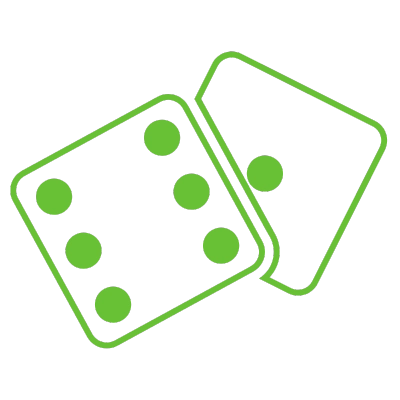
Craps
At first glance, the craps table looks super chaotic with all of the activity—there are calls for bets and chips being tossed around. But don’t let that intimidate you—when you stick to the simplest bets, like the Pass Line or Don’t Pass Line, craps becomes one of the most rewarding games for players.
The house edge for these basic bets is only 1.4%. Once you’re more comfortable, you can also place Odds Bets, which have no house edge whatsoever—meaning your payout is purely based on the roll of the dice, and there is no added advantage for the casino. This makes craps a hidden gem for players who want to minimize their losses.

Baccarat
Baccarat is an absolute dream game for beginners due to its simplicity and player-friendly odds. The game is just betting on either the Banker, the Player, or a Tie. Statistically, the Banker bet is your best option, with a house edge of only 1.06%. While you may be tempted to aim for the bigger payouts tied to a Tie bet, the house edge for that wager goes way higher, so it’s not ideal for anyone who wants better odds.
Comparison of House Edges
Understanding the numbers behind each game can really make a difference, so here is how some popular casino games compare to one another:
- Blackjack (with basic strategy): ~0.5%
- Craps (Pass/Don’t Pass Line): ~1.4%
- Baccarat (Banker bet): ~1.06%
- Roulette (European): ~2.7%
- Roulette (American): ~5.26%
- Slot Machines: Varies, but usually 5-10%
Choosing the Right Game for You
If you want to improve your chances of leaving the casino with some money in your pocket, you should concentrate on the games that combine manageable house edges with simple rules. Blackjack allows for strategy, craps have opportunities for no-edge betting, and baccarat delivers consistently low risk!
Strategies to Improve Your Odds
There is no strategy that can completely overcome the house edge, but there are some practical steps you can take to make better decisions and decrease your risk. If you’re new to gambling or just want to refine your approach, the following beginner-friendly strategies can help you get more out of your time at the casino!
Learn Basic Blackjack Strategy
Blackjack is one of the rare casino games where skill can actually make a big difference, and by learning basic strategy, you can cut the house edge to as low as 0.5%. Strategy cards are a great place to start—they have a simple guide for every hand combo that tells you when to hit, stand, double down, or split. And like we mentioned, casinos do allow players to use the cards at the table, so even if you’re a first-timer, you can make informed decisions while you play.
Practice Bankroll Management
One of the most important strategies in gambling is managing your money wisely, so decide on a budget before you start playing and stick to it, no matter what happens. Break your bankroll into smaller amounts for each session, and never chase losses by dipping into funds you didn’t plan to gamble with. A good rule of thumb is to bet no more than 1-5% of your total bankroll on a single wager, as it helps in minimizing risks while also extending your playtime.
Start Small with Bets
For beginners, smaller bets are the best way to get comfortable without risking too much money, and starting small means that you can play longer, learn the game’s rhythm, and avoid losing large amounts early on. It’s an approach that works well for games like blackjack, craps, and baccarat, where you can concentrate on improving your strategy while keeping any losses manageable.
Avoid High-House-Edge Bets
Some games and bets are designed to favor the house heavily, and avoiding them is the easiest way to improve your chances. With roulette, stick to even-money bets like red/black or odd/even rather than going for single-number bets, which carry a much higher house edge. In craps, concentrate on simple wagers like the Pass Line or Don’t Pass Line instead of complicated proposition bets that have lower payout odds.
Take Breaks and Stay Focused
Casinos are designed to keep you playing for as long as possible, but walking away from the table or machine occasionally will help you reset your frame of mind and make better decisions. Short breaks give you time to evaluate your progress, reassess your budget, and avoid any emotional or impulsive betting.
If you incorporate the above strategies into your gameplay, you can enter a casino with a plan and a sense of control. While no strategy will ever guarantee you a win, playing thoughtfully will make your experience more fun—and less risky!
The Psychology of Gambling
Gambling is so much more than games and bets—it’s also about what’s going on in your brain while you play. Casinos are certified geniuses at creating environments that keep you playing, but knowing how their tactics are messing with your head will help you keep control and gamble on your own terms!
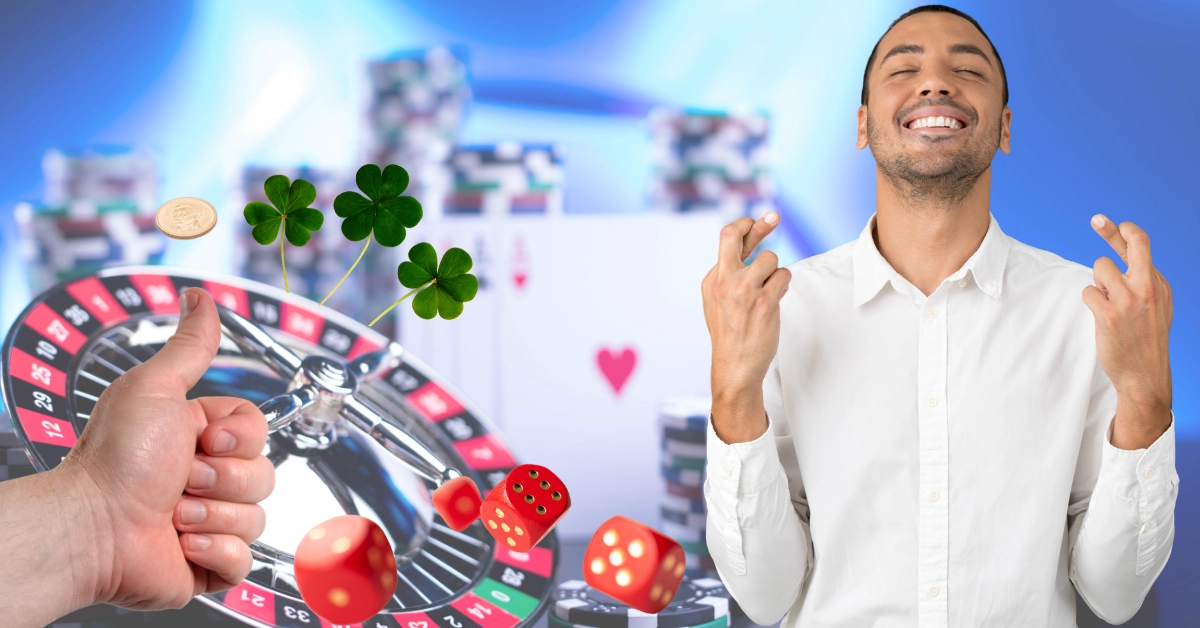
Why It Feels Like Luck’s about to Change
If you have ever been playing and your inner mantra is, “The next one has to hit”—that’s the gambler’s fallacy at work, friends. It’s the idea that if something hasn’t happened for a while—like a roulette ball landing on black—it’s somehow overdue. But the truth? Every spin, roll, or deal is totally random, and that will never change. But this mindset makes people bet more, as they think they’ve spotted a pattern. It’s a trick of the mind, but being aware of it can save you from tossing away cash.
When Losing Turns Into Chasing
Losing is never fun, and it will happen. But the real trap is when you start chasing those losses, as you are convinced that you’ll win it all back with just one big bet. That’s when gambling stops being entertainment and turns into an emotional reaction. The trick with this is to set limits before you even sit down—how much you’ll spend and how long you’ll play—and not diverge. Walking away isn’t losing; it’s keeping control.
How Casinos Keep You Hooked
Casinos know how to make it really hard to leave. Take slot machines as an example. Notice how often you get “almost” wins? That’s not an accident. Seeing symbols line up just shy of a jackpot makes you think you’re *this* close, even when you’re not. Add in the bright lights, the sounds of coins, and the free drinks, and you’ll feel like winning is just about to happen.
Practical Tips to Stay in Control
- Set Time Limits: Decide how long you’ll play before you even start, and take breaks every 30-60 minutes to stay in the right frame of mind.
- Budget Your Gambling Money: Bring only what you’re okay with losing and leave your cards (credit and ATM) at home. When the money runs out, it’s time to bounce.
- Play with a Purpose: Pick games because you enjoy them, not because you’re chasing wins.
- Know the Signs of Overdoing It: If you’re feeling stressed, frustrated, or desperate, it’s time to walk away and go home.
- Avoid Alcohol While Gambling: Free alcoholic drinks can impair even the best of judgment, which makes it easier to overspend or make impulsive bets. Stick to water or non-alcoholic drinks while you’re playing.
The Realities: Is It Really Possible to Beat the House?
Let’s cut through the BS: casinos are built to win. The house edge—the mathematical advantage that is baked into every game—guarantees that the casino will always come out on top. But does that mean it’s impossible to beat the house? Um, not exactly.
The Long Run vs. The Short Run
In the short run, anything can happen! Luck does play a huge role, and you could have a streak where the cards go your way or the dice land just right. This is why people usually walk away winners for the day, thinking that they’ve cracked the system. But in the long run, the house edge makes sure that the casino will get back those wins—and then some. It’s not personal; it’s just math.
How Professionals Find an Edge
Professional gamblers don’t rely on luck alone—they rely on consistency and discipline. They look for the games or strategies where they can tilt the odds slightly in their favor, like the ones below:
- Card Counting in Blackjack: This technique is where skilled players keep track of the cards dealt, which helps them make the most informed bets. While it’s technically not illegal, casinos do frown upon it and may ask card counters to exit the premises.
- Exploiting Promotions: Most pro players take full advantage of loyalty programs, bonuses, or promos to boost their returns.
- Poker: Unlike other casino games, poker pits players against each other instead of the house. Skilled poker players can consistently win by reading their opponents and mastering game theory.
Why Beating the House Isn’t Always the Goal
The idea of “beating the house” sounds like the ultimate end goal, but for most players? Your real goal should be enjoying the experience without losing more than you’re okay with. Gambling should be fun and not any kind of a financial strategy. The excitement of the games, the social interactions, and the entertainment value are what keep the majority of people coming back—not the promise of untold riches.
Smart Choices Make a Difference
You can’t eliminate the house edge, but you can lessen its impact by choosing games that have better odds (like blackjack or baccarat) and sticking to strategies like bankroll management. Play responsibly, set limits, and remember that gambling should always be a form of entertainment, not an investment.
The bottom line? Beating the house isn’t about flipping the odds entirely—it’s about walking in with a plan, staying disciplined, and knowing when to quit.
Tips to Maximize Fun While Gambling
Gambling is meant to be an enjoyable experience, but the fun can quickly turn into frustration if you don’t set solid boundaries. The key to making the most of your time is keeping the focus on entertainment instead of chasing wins. Below are the best tips so that you can relax and have fun while you are playing!
- Play Games You Actually Enjoy: You could gravitate toward the casino games with better odds or the promise of big jackpots, but if they’re not fun for you, what’s the point? If you love the strategy of blackjack, the fast pace of craps, or the simplicity of slots, just play what brings you happiness! After all, gambling is an activity—it’s not an obligation.
- Set Time Limits: Casinos are designed to make hours feel like minutes. Before you start, decide how long you want to play and stick to it. Set a timer or alarm on your phone to remind yourself to take a break or call it a day—pauses help you stay on task and help prevent burnout.
- Take Advantage of Casino Perks: Loyalty programs, free drinks, and bonus offers are a fun part of the casino experience. While they should never dictate how long you stay or how much you spend, there’s no harm in enjoying what’s available. And if you’re playing online, look out for free spins or match bonuses that give you added value.
- Go with Friends: Gambling with friends adds a social element that makes the experience even more fun! You can hype each other up, celebrate any wins, and keep each other accountable if someone starts overspending or chasing losses.
- Have a Budget and Stick to It: Before heading out to a casino, decide how much money you’re okay with losing, and once you hit that limit? Stop playing. Only bring cash and leave all of your cards at home so that you can’t spend more than planned, even if you want to.
- Don’t Forget to Take Breaks: Sitting at the tables or slot machines for hours can get tiring—physically and mentally. Walk around, grab a bite, or go outside for some fresh air. Breaks keep you refreshed and help you enjoy the experience.
- Keep the Focus on Fun, Not Profits: Approach gambling like you would a night out at the bar or a concert. It’s entertainment—you aren’t trying to leave with more money than you came with. Wins are just a bonus, but the actual reward is enjoying yourself without any stress or regret.
With the right mindset and a few simple boundaries, gambling can be an exciting and fun time!
FAQs
Okay, so the house almost always wins, but don’t let it beat you down! We gave you a lot of info, so to wrap up, we put together a list of the most frequently asked questions we get from readers about this topic.
What Is the House Edge, and How Does It Work?
The house edge is what keeps casinos in business—it’s the slight mathematical advantage built into every game. For example, if a game has a 5% house edge, the casino expects to make $5 for every $100 wagered over time. This doesn’t mean you can’t win, but it explains why the house always has the upper hand in the long run. Games like blackjack and baccarat tend to have lower house edges, giving you a better shot compared to slots or roulette.
Can Skill Really Improve My Chances of Winning?
Yes, but only in certain games, with Blackjack being a prime example. If you learn basic strategy, you can lower the house edge to nearly 0.5%. Poker is another skill-based game since you’re competing against other players rather than the casino. Games like slots and roulette are purely luck, so no amount of skill can change your odds.
Which Casino Games Offer the Best Odds for Players?
Blackjack, craps, and baccarat are always your best bets. Blackjack has one of the lowest house edges when you play strategically. Craps is beginner-friendly if you stick to simple bets like the Pass Line, and baccarat’s Banker bet is statistically the smartest option. Games like roulette and slots are fun but tend to favor the house more.
Is Card Counting Illegal in Blackjack?
Card counting isn’t illegal, but it’s definitely not smiled upon. If a casino suspects that you’re counting cards, they can ask you to leave or even ban you from playing blackjack altogether. It’s a strategy that works only in specific settings, and it takes a lot of practice, focus, and most of all, subtlety.
How Can I Avoid Losing Too Much Money While Gambling?
The best way to stay in control is to set a budget before you start playing and stay with it. Decide how much you’re okay with losing, and don’t go past that amount. Break your bankroll into smaller portions for each session, and don’t use non-gambling funds like your credit cards or savings.
Are There Proven Strategies to Beat the House Consistently?
There’s no secret formula to beat the house in a consistent manner. Even professional gamblers focus on small advantages over time, not guaranteed wins. The key is knowing the games, managing your money well, and playing smart. Gambling should be treated as entertainment, not as a reliable way to make money.
What Are Some Common Mistakes Beginners Make in Casinos?
Beginners usually make the mistake of betting too much, too fast. Another common faux pas is playing games without understanding the rules, like making complicated bets in craps or roulette. Chasing losses is another big one—you should always walk away instead of attempting to win back what you’ve lost in a single session.
Conclusion: Can You Stack the Deck in Your Favor?
Gambling isn’t just about luck—it’s about knowing the games, understanding your odds, and staying in control. Yes, the house always has an edge, but you can still hit the casino floor with smart strategies that make the experience both fun and rewarding.
Look below for a quick recap of how to gamble responsibly and with a little more confidence:
- Understand the House Edge: Knowing how casinos are designed to profit will help you to make better decisions.
- Choose Games Wisely: Blackjack, craps, and baccarat have better odds than slots or roulette.
- Bust the Myths: Forget ideas like “lucky machines” or guaranteed winning streaks—knowledge always beats out superstition.
- Stay in Control: Budget your money, take breaks, and don’t make emotional or impulsive decisions.
- Focus on Fun: Gambling is entertainment, so enjoy the experience without any pressure.
Are there any strategies that have worked for you when you play? Have you ever found a game or a strategy that gave you an edge? Tell us in the comments!
